Modular Toolkit
Find everything you need to educate about how easy, nutritious, and delicious it is to eat more canned beans. And now, you also can find all the tools you need to educate about the sustainability of canned beans. When you’re looking for food that is nutritious, delicious, and sustainable...it’s in the can.

In support of the thousands of Registered Dietitian Nutritionists sharing the beanefits of canned beans, cannedbeans.org created a dynamic, modular toolkit to allow users to customize their promotional messaging.
Packed with headlines, copy, recipes, images and graphics, this toolkit has everything needed to promote the health beanefits of beans. Scientific support for all of the health beanefits can be found in the Substantiation Library.
The simple “highlight, copy and paste” format makes creating unique messaging a snap, and the supporting research instills confidence in the credibility of the content. Adding canned beans to your editorial calendar has never been easier.
Get Started Today!
Fun Facts About Beans
- The bean, one distinct food that has been nourishing humans for at least 8,000 years, has been the star of dietary and eating plan recommendations and the subject of hundreds of evidence-based research studies.
- Beans pack the trifecta of weight management tools – fiber, protein and delicious taste.
- Per serving, on average, beans provide more protein and fiber than other vegetable sources.
- Canned beans have a long shelf life, so they are always “in-season” whenever you reach for them.
- One 15-ounce can of beans equals about 3.5 servings.
- Canning helps make fiber in certain vegetables, like beans, more soluble which improves digestion.
- The thermal heat process associated with canning preserves the beans inside the can. It kills pathogens, kills spoilage organisms, and inactivates enzymes.
- Metal is strong yet malleable, allowing for the creation of a double-seam seal. The metal can is suitable for a ‘high temperature / high pressure’ cook process AND creates a vacuum that protects the product from contamination.
Headlines and Messaging
Scientific support for all of the health beanefits can be found in the Substantiation Library.
Scientific support for all of the sustainability beanefits can be found in the Substantiation Library.
Nutrition
Headlines
- Canned beans make it convenient and deliciously easy to add more plants to the diet.
- Canned beans offer a simple, convenient, and tasty way to add flavor, texture, and variety to just about any meal.
- Enjoy beans whole-heartedly!
- Beans, beans, they’re good for your heart!
- Open a can of beans to close nutrient gaps.
- Eating beans is good! Eating more is even better.
- There’s bean a lot of talk about the health beanefits of beans!
- Don’t fall short on nutrients. Add a serving (or 2!) of beans each day.
- Small but mighty, beans are a nutritional powerhouse.
Messaging
It’s no secret that canned beans are nutritious. But did you know they have health beanefits that support the prevention and management of diabetes?
- The goodness of beans extends beyond their ability to help control blood sugar. They promote digestive health can help prevent heart disease, can help maintain and lose weight, and can make people healthier.
- Beans do contain carbohydrates, but ½ cup also provides as much protein as an ounce of meat without the saturated fat.
- Protein group? Check. Vegetable group? Check. Beans, peas, and lentils, known as pulses, are unique foods in that they are considered a part of both!1
- Beans pack the trifecta of weight management – fiber, protein, and delicious taste. A naturally rich source of dietary fiber, beans help promote health and support weight management. In addition, the protein helps aid satiety and maintain muscle mass.2 3
- Make a simple swap. Exchanging pulses for small amounts of other protein foods and refined grains improves the nutritional profile of the diet by enriching it with important nutrients such as protein, fiber, iron, and potassium.4
- Beans are the MVP of the plate—helping you reach higher diet quality scores.5 Highest diet quality scores are associated with 24% decreased risk of cardiovascular disease, 31% reduced risk for coronary heart disease, 20% lowered risk for stroke, 23% decreased risk for diabetes, 6% reduced risk for cancer.6
- Don’t fall short on important nutrients. Adding just one serving of beans a day helps to close the nutrient gaps (including dietary fiber, potassium, magnesium, iron, folate, and choline).7
- Most people in the United States are not eating enough beans, peas, and lentils, or pulses. In fact, more than 80% of the population is consuming below the recommendations.8
- Take beans to heart. Eating pulses can help prevent heart disease. How? Adequate pulse consumption can lower both total and LDL-cholesterol levels.9
- Pulses can help in the management of Type 2 Diabetes Mellitus. Research shows improvements in fasting glucose levels and insulin sensitivity when pulses are incorporated into diets.
Sustainability
Headlines
- Looking for food options that benefit the environment and human health while reducing costs for consumers? It’s in the can...canned beans and chickpeas!
- When it comes to canned beans and chickpeas, a low carbon footprint makes for highly sustainable foods.
- Want to boost nutrition and cut down on food waste? Can it—with beans and chickpeas!
Messaging
- If you are adjusting your diet to benefit the environment and human health, add more beans and chickpeas.
- Adding a couple of servings of beans and chickpeas each week in place of animal proteins helps close nutrient gaps while increasing fiber. Choosing canned varieties makes it a delicious and easy swap!
- Food waste contributes to greenhouse gas emissions, which disrupt ecosystems, economies, human health, and well-being. Choosing canned foods, like beans and chickpeas, helps reduce food waste and protect the environment.
- On average, plant-based products generate significantly fewer greenhouse gas (GHG) emissions than animal-based products. In fact, legumes can produce up to 250 times less GHG emissions per gram of protein compared to some commonly consumed meats.10 11
- Beans and chickpeas naturally improve soil health by adding nitrogen, reducing the need for additional fertilizers, which can improve community water quality and save farmers money.
- Canning safely locks in the inherent nutritional value of beans and chickpeas10, preserving their plant-based protein, fiber, and micronutrients without the need for added preservatives or refrigeration, making them both a sustainable and nutritious pantry staple.
- Research shows that beans and chickpeas are among the most affordable sources of protein available,11 and eating two servings of plant-based proteins, such as beans and chickpeas, weekly in place of two servings of animal proteins, such as meat, increases fiber and helps close nutrient gaps (including folate, iron, potassium, magnesium, zinc and B vitamins).12
- Incorporating beans and chickpeas into crop rotations is an effective way to improve the productivity of land, increase yield, and minimize the risk of crop loss related to pests and disease.13
- Canned beans and chickpeas are shelf-stable, which reduces food waste and favorably impacts the environment. It is estimated that up to 40% of the US food supply is wasted14 contributing approximately 6% of total US greenhouse gas (GHG) emissions.15 This demonstrates the importance of choosing foods that help minimize food waste, like canned beans and chickpeas.
- The resilience of beans and chickpeas in diverse and harsh environments, including non-irrigated farmland that supports many food-insecure populations, makes them an ideal crop for securing a nutritious global food supply.16
- Steel food cans have the highest recycling rate of any food packaging (58%). Most other materials can only be recycled a few times — if at all — before losing quality and being sent to landfill. In fact, more than 75% of all steel ever produced is still in use.17
Additional Health, Nutrition and Sustainability Messaging
- Beans have nourished cultures around the world for centuries. Today, canned beans offer a tasty, convenient, and nutritious option that supports both personal well-being and a healthier planet. From health and nutrition to convenience and safety, great taste and variety to versatility and value, environmentally friendly and good for the planet, the reasons for choosing canned beans are as plentiful as the ways they can be used.
- What could be easier than opening a can of beans? The possibilities are endless. From cooked to eaten straight-from-the-can, the versatility and convenience of canned beans can’t be beat.
- Delicious, nutritious, inexpensive, and easy to use, canned beans add taste, texture, and nutrition to any dish. From entrees and sides, appetizers and desserts, you can’t go wrong.
- Given their health beanefits, versatility, sustainability, and delicious flavor, canned beans bring great taste and convenience to plant-based diets, making it easier than ever to add more plant-based foods to your meals.
- Canned beans can be used to replace some (or all) of the meat typically included in traditional recipes to add taste, texture, and nutrition while reducing a dish’s cholesterol, saturated fat, and carbon footprint.
- From health and nutrition to convenience and affordability, great taste and variety to versatility and value, the reasons for choosing canned beans are as plentiful as the ways they can be used. The American Diabetes Association named beans a Diabetes Superfood.18 Kidney, pinto, navy, or black beans are packed with vitamins and minerals such as magnesium and potassium. They are very high in fiber too.
- The muscles’ response to protein becomes muted overtime, so as we get older, we need to consume additional protein.19 Canned beans make it easy to add more protein to the diet.
- Beans have been a staple for diets worldwide for more than two centuries. Canned beans are a great choice for those looking for great-tasting, delicious, and convenient solutions.
- From health and nutrition to convenience and safety, great taste and variety to versatility and value, the reasons for choosing canned beans are as plentiful as the ways they can be used.
- What could be easier than opening a can of beans? The possibilities are endless. From main dishes to sides, appetizers to desserts (yes, desserts!), cooked to straight-from-the-can, the versatility and convenience of canned beans can’t be beat.
- Delicious, nutritious, inexpensive, and easy to use, canned beans add taste, texture and nutrition to any dish. From entrees and sides, appetizers and desserts, you can’t go wrong.
- Given their health beanefits, versatility and delicious flavor, canned beans bring great taste and convenience to plant-based diets, making it easier than ever to add more plant-based foods to your meals.
- Canned beans can be used to replace some or all the meat typically included in traditional recipes to add taste, texture, and nutrition while reducing a dish’s cholesterol and saturated fat.
- Beans, beans, the musical fruit. The more you eat, the more you, well, you know. But did you know that the Academy of Nutrition and Dietetics holds the position that the public should consume adequate amounts of fiber from a variety of plant foods?20
Footnotes
- US Department of Agriculture; U.S. Department of Health and Human Services. Dietary Guidelines for Americans, 2020–2025, 9th ed.; 2020. https://www.dietaryguidelines.gov/sites/default/files/2020-12/Dietary_Guidelines_for_Americans_2020-2025.pdf (accessed on 4 April 2023).
- Shana J Kim, Russell J de Souza, Vivian L Choo, Vanessa Ha, et al. Effects of dietary pulse consumption on body weight: a systematic review and meta-analysis of randomized controlled trials. American Journal of Clinical Nutrition, March 2016. DOI: 10.3945/ajcn.115.124677.
- Bonjour JP. The dietary protein, IGF-I, skeletal health axis. Horm Mol Biol Clin Investig.2016 Oct 1;28(1):39-53. doi: 10.1515/hmbci-2016-0003. PMID: 26985688.
- Agarwal S, Fulgoni VL 3rd. Effect of Adding Pulses to Replace Protein Foods and Refined Grains in Healthy Dietary Patterns.Nutrients.2023 Oct 13;15(20):4355. doi: 10.3390/nu15204355. PMID: 37892430; PMCID: PMC10610119.
- Mitchell DC, Marinangeli CPF, Pigat S, Bompola F, Campbell J, Pan Y, Curran JM, Cai DJ, Jaconis SY, Rumney J. Pulse Intake Improves Nutrient Density among US Adult Consumers.Nutrients.2021 Jul 31;13(8):2668. doi: 10.3390/nu13082668. PMID: 34444828; PMCID: PMC8398140.
- M.L. McCullough, D. Feskanich, M.J. Stampfer, E.L. Giovannucci, E.B. Rimm, F.B. Hu, et al. Diet quality and major chronic disease risk in men and women: Moving toward improved dietary guidance.Am J Clin Nutr.76 (2002) 1261-1271.
- Yanni Papanikolaou, Joanne Slavin, Sofia Papanikolaou, Victor L. Fulgoni. Adding more beans to the US typical dietary pattern can lead to greater intake of shortfall nutrients and a higher diet quality in younger and older adults. Maturitas,2024,108012,ISSN 0378-5122.
- US Department of Agriculture; U.S. Department of Health and Human Services. Dietary Guidelines for Americans, 2020–2025, 9th ed.; 2020. Available online: https://www.dietaryguidelines.gov/sites/default/files/2020-12/Dietary_Guidelines_for_Americans_2020-2025.pdf (accessed on 4 April 2023).
- Zhao N, Jiao K, Chiu Y-H, Wallace TC. Pulse Consumption and Health Outcomes: A Scoping Review. Nutrients.2024; 16(10):1435.
- Z. Boz, R. Uyar, F. Erdoğdu. Heat Treatment of Foods. Principles of Canning. Science Direct. 2014, Pages 160-168. doi.org/10.1016/B978-0-12-384730-0.00156-7
- Drewnowski A, Conrad Z. Pulse crops: nutrient density, affordability, and environmental impact. Front Nutr. 2024 Aug 23;11:1438369. doi: 10.3389/fnut.2024.1438369. PMID: 39246405; PMCID: PMC11377338.
- Gazan R, Maillot M, Reboul E, Darmon N. Pulses Twice a Week in Replacement of Meat Modestly Increases Diet Sustainability. Nutrients. 2021 Aug 31;13(9):3059. doi: 10.3390/nu13093059. PMID: 34578936; PMCID: PMC8466503.
- Lisciani S, Marconi S, Le Donne C, Camilli E, Aguzzi A, Gabrielli P, Gambelli L, Kunert K, Marais D, Vorster BJ, Alvarado-Ramos K, Reboul E, Cominelli E, Preite C, Sparvoli F, Losa A, Sala T, Botha AM, Ferrari M. Legumes and common beans in sustainable diets: nutritional quality, environmental benefits, spread and use in food preparations. Front Nutr. 2024 May 6;11:1385232. doi: 10.3389/fnut.2024.1385232.
- (2025, January 13). Food loss and waste. U.S. Food and Drug Administration. https://www.fda.gov/food/consumers/food-loss-and-waste
- Harwood, A., Mao, S., Ringland, M., & Zurita, J. (2023, May 24). Refed’s new estimates on food waste in the United States: 2020-2021, trends, and covid-19 impact. ReFED. https://refed.org/articles/refed-s-new-estimates-on-food-waste-in-the-united-states-2020-2021-trends-and-covid-19-impact/
- Kumar S, Gopinath KA, Sheoran S, Meena RS, Srinivasarao C, Bedwal S, Jangir CK, Mrunalini K, Jat R, Praharaj CS. Pulse-based cropping systems for soil health restoration, resources conservation, and nutritional and environmental security in rainfed agroecosystems. Front Microbiol. 2023 Feb 3;13:1041124. doi: 10.3389/fmicb.2022.1041124. PMID: 36817102; PMCID: PMC9935831.
- Can Manufacturers Institute. CannedGood.com https://cannedgood.cancentral.com/ (Accessed 6/16/25)
- https://www.diabetes.org/healthy-living/recipes-nutrition/eating-well/diabetes-superfoods
- Phillips SM, Padden-Jones D, Layman DK. Optimizing adult protein intake during catabolic health conditions.
- Dahl W, Stewart A. Position of the Academy of Nutrition and Dietetics Health Implications of Dietary Fiber.Journal of the Academy of Nutrition and Dietetics.
Evidenced-Based Messaging
Scientific support for all of the health beanefits can be found in the Substantiation Library.
Following are health beanefits commonly associated with beans.
Weight Management
- A naturally rich source of dietary fiber, beans help promote health and support weight management.
- The protein in beans helps aid satiety and maintain muscle mass. In addition to calcium associated with an adequate supply of vitamin D, dietary protein represents a key nutrient for bone health.
Health Risk Mitigation
- Beans, a naturally rich source of dietary fiber, help promote digestive health and support weight management and weight loss. These benefits help reduce risk for coronary heart disease, stroke, hypertension, diabetes, obesity, and certain gastrointestinal diseases.
- Increased fiberintake is associated with reduced blood pressure and reduced total and LDL-cholesterol levels.
- Individuals who eat beans regularly have a longer life expectancy than those who don’t eat beans regularly.
- The American Institute for Cancer Research (AICR) recommends that individuals make whole grains, vegetables, fruits and pulses (legumes) such as beans and lentils a major part of their normal diet.
Diabetes Management
Beans can aid in the prevention and management of diabetes.
- Eating beans may help with the prevention of diabetes and the management of blood glucose levels.
- Eating beans can help manage blood glucose/improve glycemic control by improving insulin sensitivity and lowering A1c.
- Bioactive compounds (triacylglycerols or TAGs) in red kidney beans show antidiabetic effects via inhibition of α-glucosidase.
- A recent study in Chinese T2DM patients showed that bean-based breakfasts significantly reduced postprandial glucose levels & promoted insulin secretion vs. white rice-based meal.
- Eating beans can help people lose or maintain weight.
Digestive Health
- It is the position of the Academy of Nutrition and Dietetics that the public should consume adequate amounts of fiber from a variety of plant foods.
- Higher intakes of dietary fiber reduce the risk of developing several chronic diseases, including cardiovascular disease, type 2 diabetes, and some cancers, and have been associated with lower body weights.
- Healthy adults and children can achieve adequate dietary fiber intakes by increasing their intake of plant foods (including whole grains, legumes, vegetables, fruits and nuts) while concurrently decreasing energy from foods high in added sugar and fat, and low in fiber.
Diet Quality
- Beans are excellent sources of fiber, folate and potassium and excellent sources of plant protein that also provides iron and zinc like other protein foods.
- Bean and/or chickpea consumption in the US population may result in better diet quality with diets that are more nutrient dense than those without beans. Nutrients include: on average, 100 g serving of canned beans contributes:
- 115-140 Kcal
- 1-3 g total fat
- 19-21 g carbohydrate
- 6-7 g fiber
- 7-8 g protein
- 40-70 mg calcium
- 140-250 mg potassium
Affordability
- Canned Beans Make Cents!! At less than half the price per pound for chicken and approximately 20% the cost per pound for beef, canned beans help stretch the family food budget. Studies show that pulses are a source of low-cost plant-based protein and offer a variety of priority vitamins and minerals.
Substantiation Sidebars
Scientific support for all of the health beanefits can be found in the Substantiation Library.
Beans: A Nutritional Powerhouse
- Delicious, nutritious, inexpensive, and easy to use, canned beans add taste, texture, and nutrition to any meal. Beans provide fiber, folate and potassium and excellent sources of plant protein while also providing iron and zinc like other protein foods.1
- The US Dietary Guidelines for Americans 2020 – 2025 and the USDA’s Choose My Plate indicate that beans, peas, and lentils can be considered as part of the vegetable or protein groups.
The Great Bean Swap
- Replacing other proteins with pulses significantly improves the nutritional profile of the diet. Adding about ¼ cup of pulses per day in place of one ounce per day of other protein foods increases fiber, a nutrient of concern, and decreases cholesterol, each by more than 10%.2
- Exchanging pulses for refined grains enriches the diet with important nutrients including (among others) protein, fiber, iron and potassium. Substituting ½ cup of pulses daily in place of one ounce of refined grains daily increases fiber, magnesium, copper, and potassium, a nutrient of concern, by more than 10%.3
Health Effects Associated With Beans
- Dietary patterns rich in beans (including beans, black beans and/or pinto beans) and/or chickpeas are associated with significantly higher diet quality scores. Bean and/or chickpea consumption in the US population may result in better diet quality with diets that are more nutrient dense than those without beans.4
- Dietary patterns rich in beans (including kidney beans, black beans and/or pinto beans) and/or chickpeas are associated with greater intake of shortfall nutrients, including nutrients of public health concern.4 Bean and/or chickpea consumption in the US population may result in better diet quality with diets that are more nutrient dense than those without beans.5
- The addition of beans to the US typical dietary pattern resulted in large and significant increases in several shortfall nutrients, including dietary fiber, potassium, magnesium, iron, folate and choline.6
- United States Department of Agriculture. MyPlate. https://www.myplate.gov/eat-healthy/protein-foods/beans-peas-lentils#:~:text=Like%20vegetables%20%E2%80%93%20beans%2C%20peas%2C,nutrition%20to%20keep%20us%20healthy. (accessed on 29 May 2024).
- Agarwal S, Fulgoni VL 3rd. Effect of Adding Pulses to Replace Protein Foods and Refined Grains in Healthy Dietary Patterns. Nutrients. 2023 Oct 13;15(20):4355. doi: 10.3390/nu15204355. PMID: 37892430; PMCID: PMC10610119.
- Agarwal S, Fulgoni VL 3rd. Effect of Adding Pulses to Replace Protein Foods and Refined Grains in Healthy Dietary Patterns. Nutrients. 2023 Oct 13;15(20):4355. doi: 10.3390/nu15204355. PMID: 37892430; PMCID: PMC10610119.
- Papanikolaou Y, Slavin J, Fulgoni VL 3rd. Adult dietary patterns with increased bean consumption are associated with greater overall shortfall nutrient intakes, lower added sugar, improved weight-related outcomes and better diet quality. Nutr J. 2024 Mar 20;23(1):36. doi: 10.1186/s12937-024-00937-1. PMID: 38504300; PMCID: PMC10953200.
- Mitchell DC, Marinangeli CPF, Pigat S, Bompola F, Campbell J, Pan Y, Curran JM, Cai DJ, Jaconis SY, Rumney J. Pulse Intake Improves Nutrient Density among US Adult Consumers. Nutrients. 2021 Jul 31;13(8):2668. doi: 10.3390/nu13082668. PMID: 34444828; PMCID: PMC8398140.
- Papanikolaou Y, Slavin J, Fulgoni VL 3rd. Adult dietary patterns with increased bean consumption are associated with greater overall shortfall nutrient intakes, lower added sugar, improved weight-related outcomes and better diet quality. Nutr J. 2024 Mar 20;23(1):36. doi: 10.1186/s12937-024-00937-1. PMID: 38504300; PMCID: PMC10953200.
Infographic Components
Scientific support for all of the health beanefits can be found in the Substantiation Library.
Headlines
- Beans (including kidney beans, black beans and/or pinto beans) and chickpeas are a nutritional powerhouse.
- Beans (including kidney beans, black beans and/or pinto beans) and chickpeas help close nutrient gaps.
- Beans (including kidney beans, black beans and/or pinto beans) and chickpeas help improve weight-related outcomes.
- Dietary patterns rich in beans and pulses (including beans, black beans, pinto beans and/or chickpeas) are associated with significantly higher diet quality scores.
- Important Fact: Beans and pulses are sources of fiber, folate, and potassium and plant protein while also providing iron and zinc like other protein foods.
- What could be simpler and more inspirational than opening a can of beans?
- Beans have been a staple in pantries and around the world for centuries.
- Canned Beans are a great choice for today’s healthy-minded consumers looking for great tasting, convenient solutions.
Content
- Providing fiber and protein, beans are nutrient-dense. Among the varieties, they may contain many nutrients that are important for a healthy diet include (among others) iron, potassium, calcium and magnesium.
- With gluten-free, dairy-free, and vegetarian options, canned beans are ideal for today's varied diets.
- Beans’ high fiber content and low-glycemic index means they are great for people with diabetes. In fact, the American Diabetes Association refers to them as Superstar Foods!
- Canned beans make it easy to add more plants to your diet and reduce meat intake, lowering daily caloric and cholesterol intake.
- Canned beans save time and money. They are extremely affordable, always in season and always ready to use.
- Bean and/or chickpea consumption in the US population may result in better diet quality creating diets that are more nutrient dense than those without beans and pulses.1 Nutrients include: on average, 100 g serving of canned beans contributes:
- 115-140 Kcal
- 1-3 g total fat
- 19-21 g carbohydrate
- 6-7 g fiber
- 7-8 g protein
- 40-70 mg calcium
- 140-250 mg potassium2
- Mitchell DC, Marinangeli CPF, Pigat S, Bompola F, Campbell J, Pan Y, Curran JM, Cai DJ, Jaconis SY, Rumney J. Pulse Intake Improves Nutrient Density among US Adult Consumers. Nutrients. 2021 Jul 31;13(8):2668. doi: 10.3390/nu13082668. PMID: 34444828; PMCID: PMC8398140.
- U.S. Department of Agriculture, Agricultural Research Service, Beltsville Human Nutrition Research Center. FoodData Central. [Internet]. [cited March 6, 2025]. Available from https://fdc.nal.usda.gov.
Turnkey Fact Sheets
Third Party Resources

American Pulse Association
A non-profit organization, the APA is devoted to increasing the consumption of pulses, i.e. dry peas, lentils, chickpeas, and beans. The APA membership works to fund research focused on the nutrition, functionality, and sustainability of pulse crops to generate interest in new products and expand current markets. The APA joined with the USA Dry Pea & Lentil Council to support the UN International Year of Pulses in 2016 and continues to help promote dry peas, lentils, chickpeas, and beans for the US and the world. American Pulse Association

Beans is How
Beans is How is an ambitious campaign with the goal to double the global consumption of beans (as well as peas, lentils and other pulses) by 2028. The campaign seeks to amplify and make visible the importance of beans as a simple, affordable solution to our global financial, health and environmental challenges while uplifting policy and academic research and galvanizing significant stakeholder action to reach this ambitious goal. Beans is How

Coalition for the Advancement of Pulses
The Coalition for Advancement of Pulses (CAP) is an initiative led by the American Pulse Association (APA) with support from the USA Dry Pea and Lentil Council (USADPLC), the Pulse Foundation, the U.S. Dry Bean Council (USDBC), and the U.S. Pea and Lentil Trade Association and represents a collective of pulse crop growers, processors, manufacturers, and related organizations. The Coalition for the Advancement of Pulses is committed to increasing the consumption of pulses in the United States by increasing research on the nutritional beanefits of pulses and growing awareness about the many health beanefits of pulses. For more information, please contact [email protected]. Coalition for the Advancement of Pulses

Colorado Dry Bean Committee
The Colorado Dry Bean Committee was created by the Colorado Department of Agriculture to promote the Colorado dry bean industry through market development and research. Colorado Dry Bean Committee

Michigan Bean Commission
The Michigan Bean Commission, dedicated to researching and promoting dry beans, contributes to Michigan’s global recognition as a top producer of dry edible beans. More than 1,100 bean conventional and organic growers in the state are dedicated to bringing consumers a delicious variety of high-quality, nutritious dry beans. Harvested from late August through October, Michigan beans are available year-round, either canned or in dry packaging. Michigan Bean Commission

Northharvest Bean Growers Association
Created in 1976 as a cooperative effort between dry bean growers in North Dakota and Minnesota, Northarvest Bean Growers Association (NBGA) provides a full range of services and funding to help producers and shippers supply the world with dry beans. NBGA:
- Helps fund export marketing initiatives, advertising, trade shows public relations,and communications.
- Funds research to improve the quantity, variety, and quality of dry beans grown in the region.

US Dry Beans Council
The USDBC is a private trade association comprised of leaders in the bean industry with the common goal of promoting the U.S. edible bean trade, both in the United States and abroad, and educating U.S. consumers about the beanefits of beans. The USDBC also is a resource for information on U.S. exporters, overseas importers, U.S. dry bean classes, trade policy issues and the role of U.S.-grown beans in international food-aid efforts. USDBC also publishes foreign language newsletters and other publications designed to help overseas importers, packagers and canners better understand and maintain contact with the U.S. dry bean exporting trade.
As part of USDBC’s mission, the organization collaborates with public health organizations, research centers, universities, and the entire supply chain, from seed suppliers to farmers, processors, wholesalers, distributors and transporters. US Dry Beans Council

US Dry Pea and Lentil Council
The USA DPLC is a non-profit organization to promote and protect the interests of growers, processors, warehousemen and sellers of dry peas, lentils and chickpeas in the United States. The 5,000 growers, processors, exporters and associates represented by the USA DPLC take pride in their ability to produce the highest quality dry peas, lentils and chickpeas for national and international markets. U.S. dry peas, lentils and chickpeas - earning the "Standard of Quality" seal every day. US Dry Pea and Lentil Council

USA Pulses
The USA Dry Pea & Lentil Council and the American Pulse Association represent the dry pea, lentil, dry bean, and chickpea industry in the United States. Also known as “pulses” these crops are nutritional powerhouses packed with protein, fiber, and other essential nutrients. Pulses are versatile in all kinds of recipes. As an added benefit, dry peas, lentils, beans and chickpeas are a sustainable crop that beanefits the soil and work well in many crop rotations. So, pulses are a terrific crop to grow, and eat! USA Pulses
Turnkey Fact Sheets & Infographics
Scientific support for all of the health beanefits can be found in the Substantiation Library.

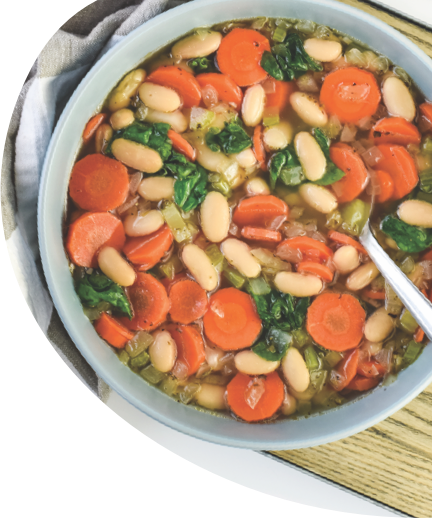













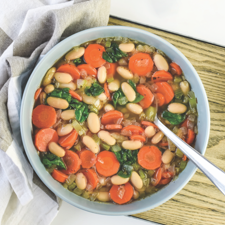








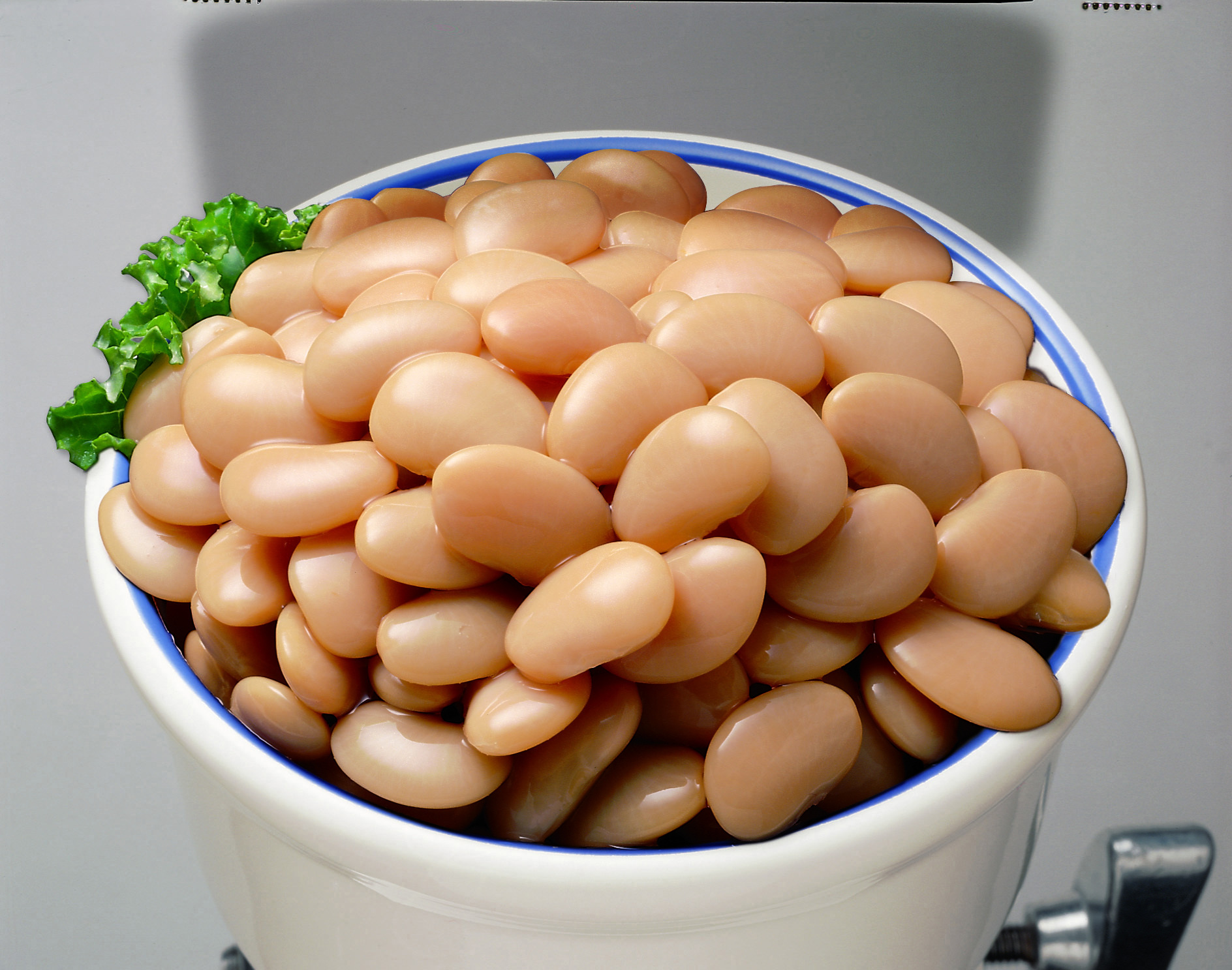
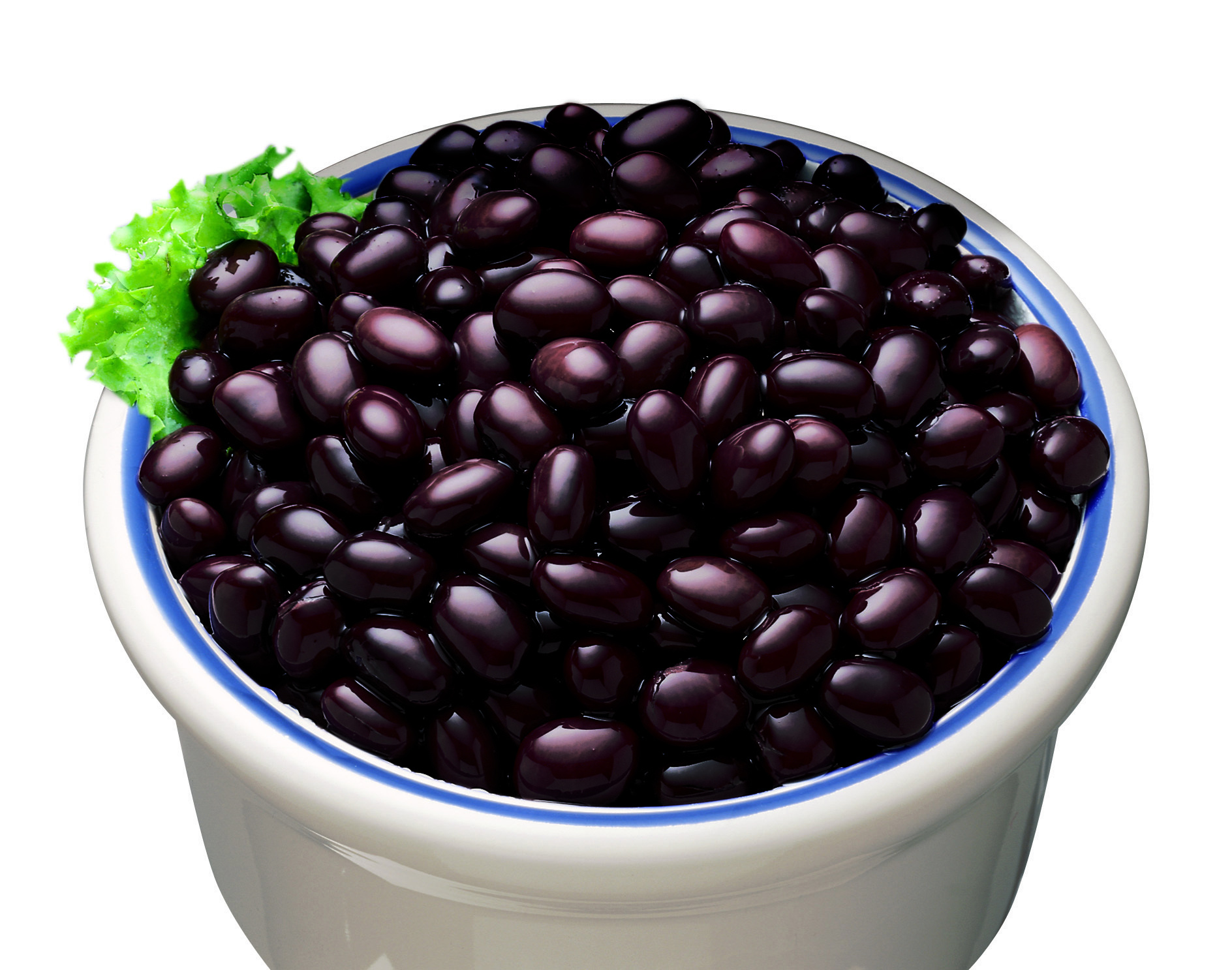

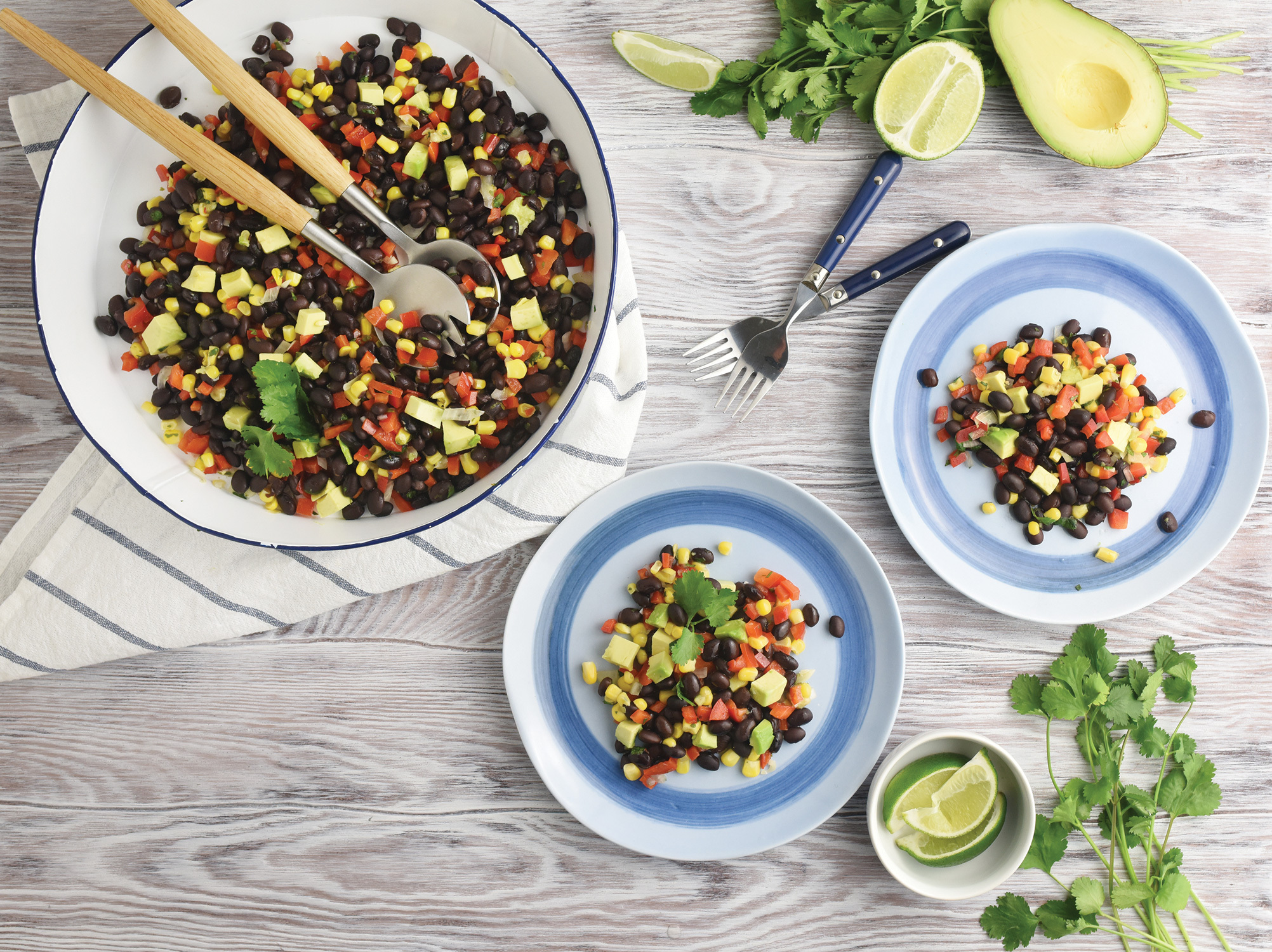

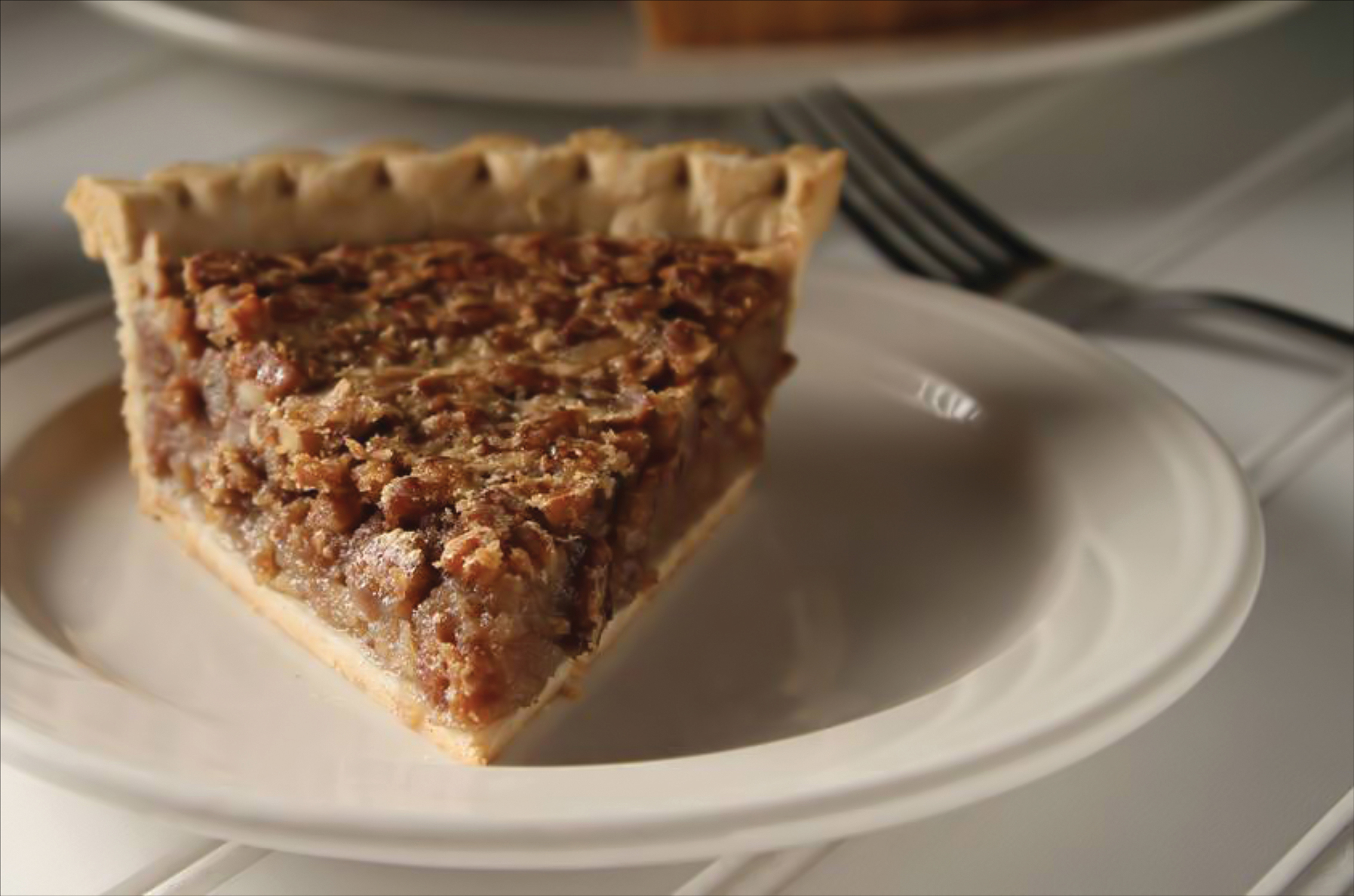
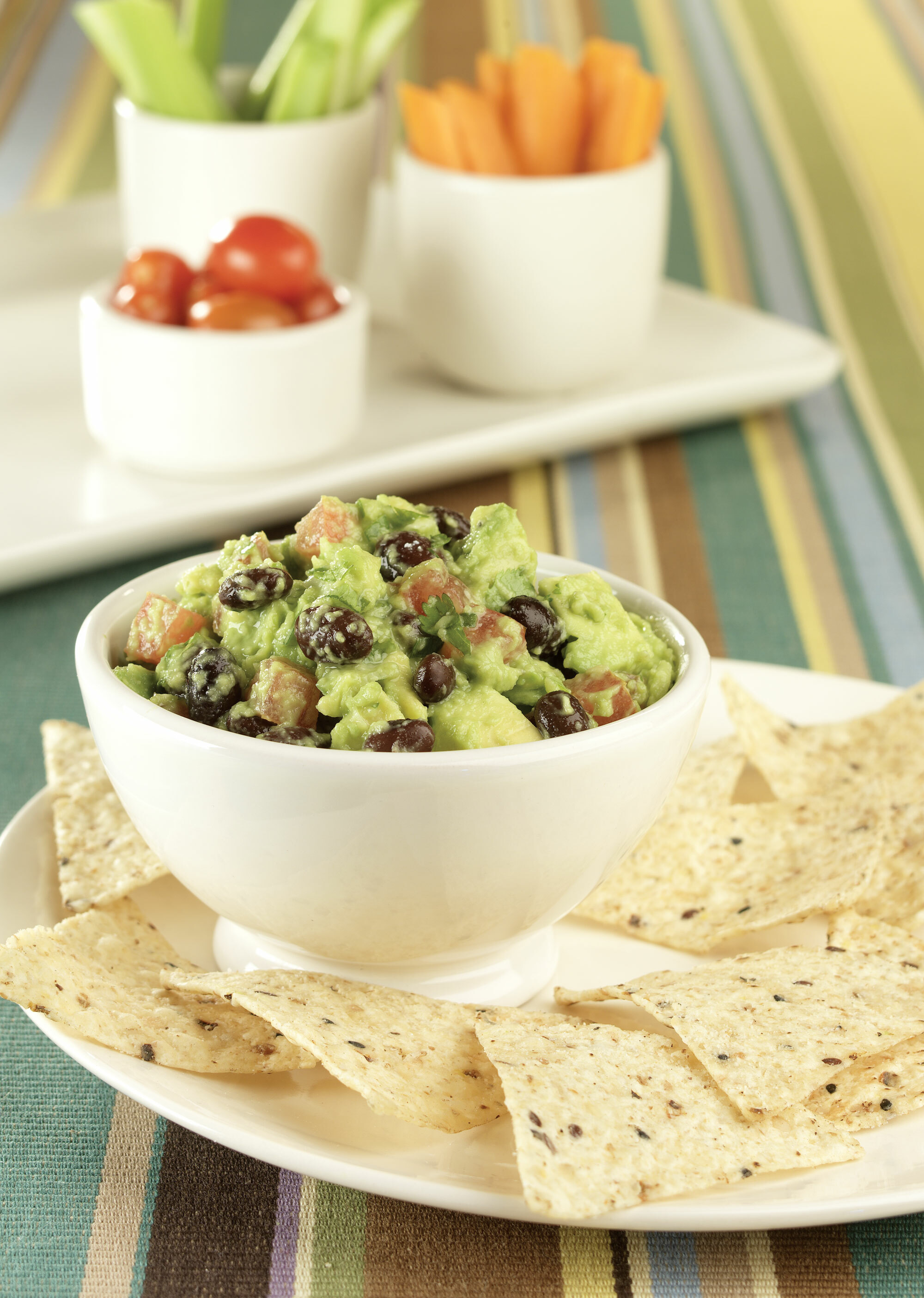






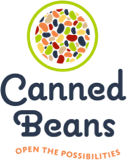


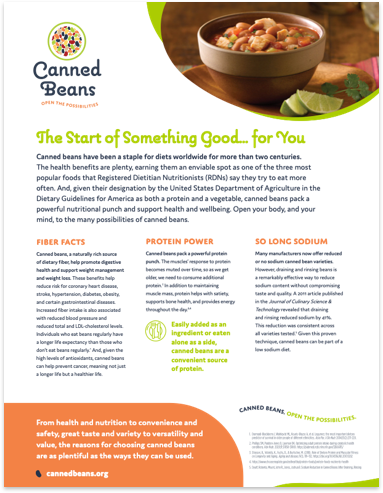
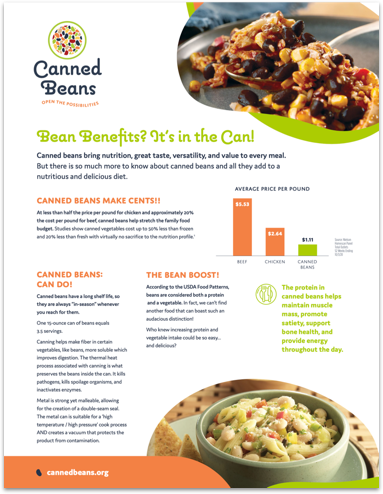
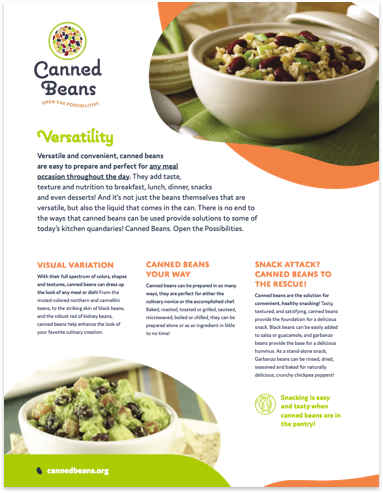
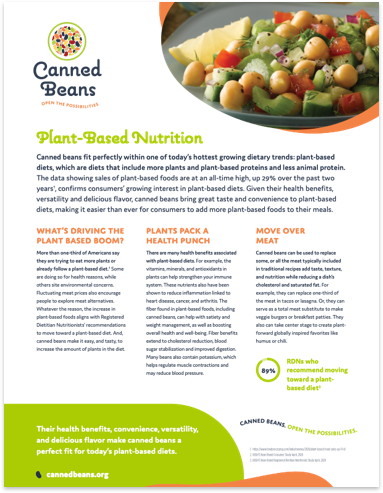
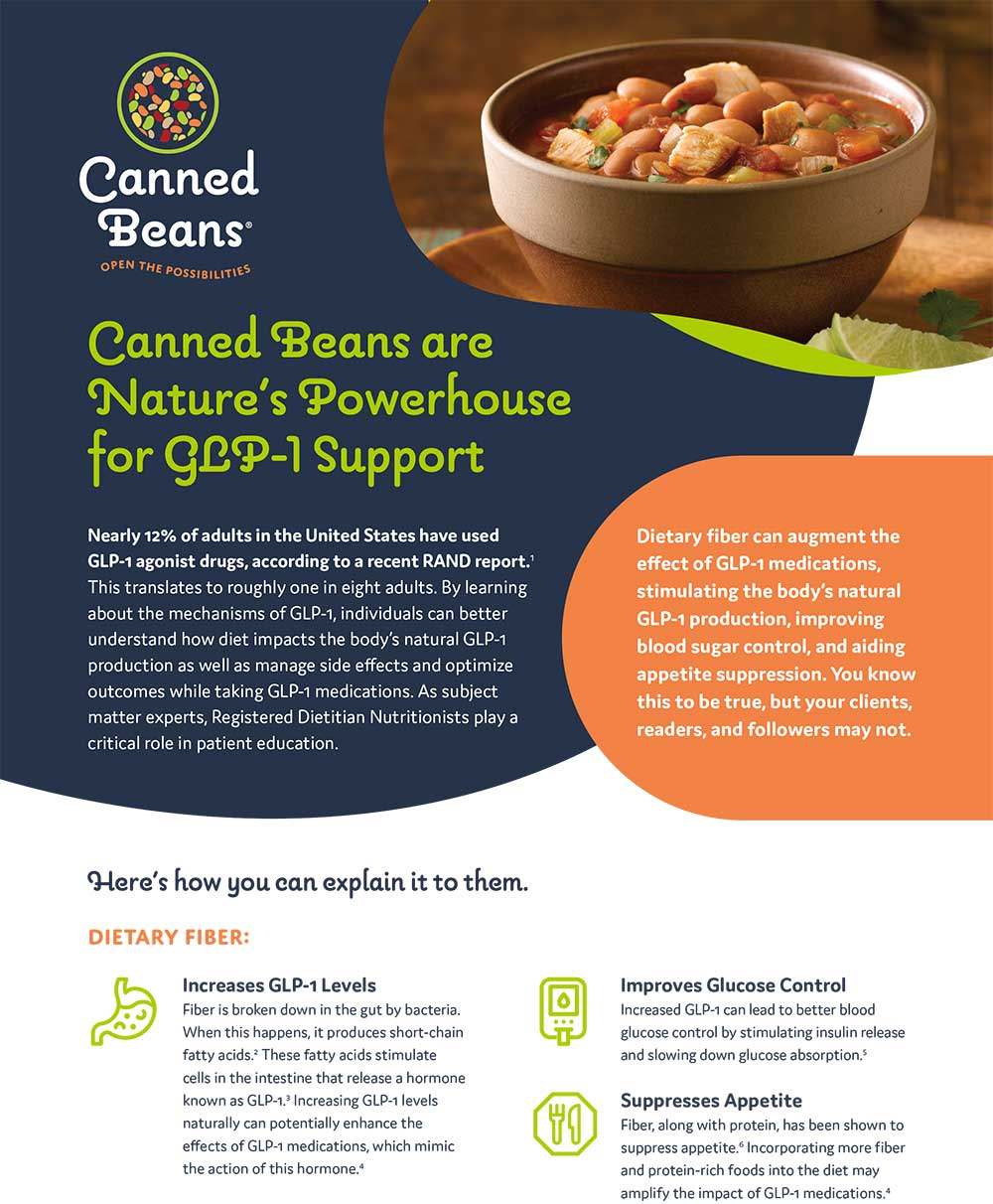
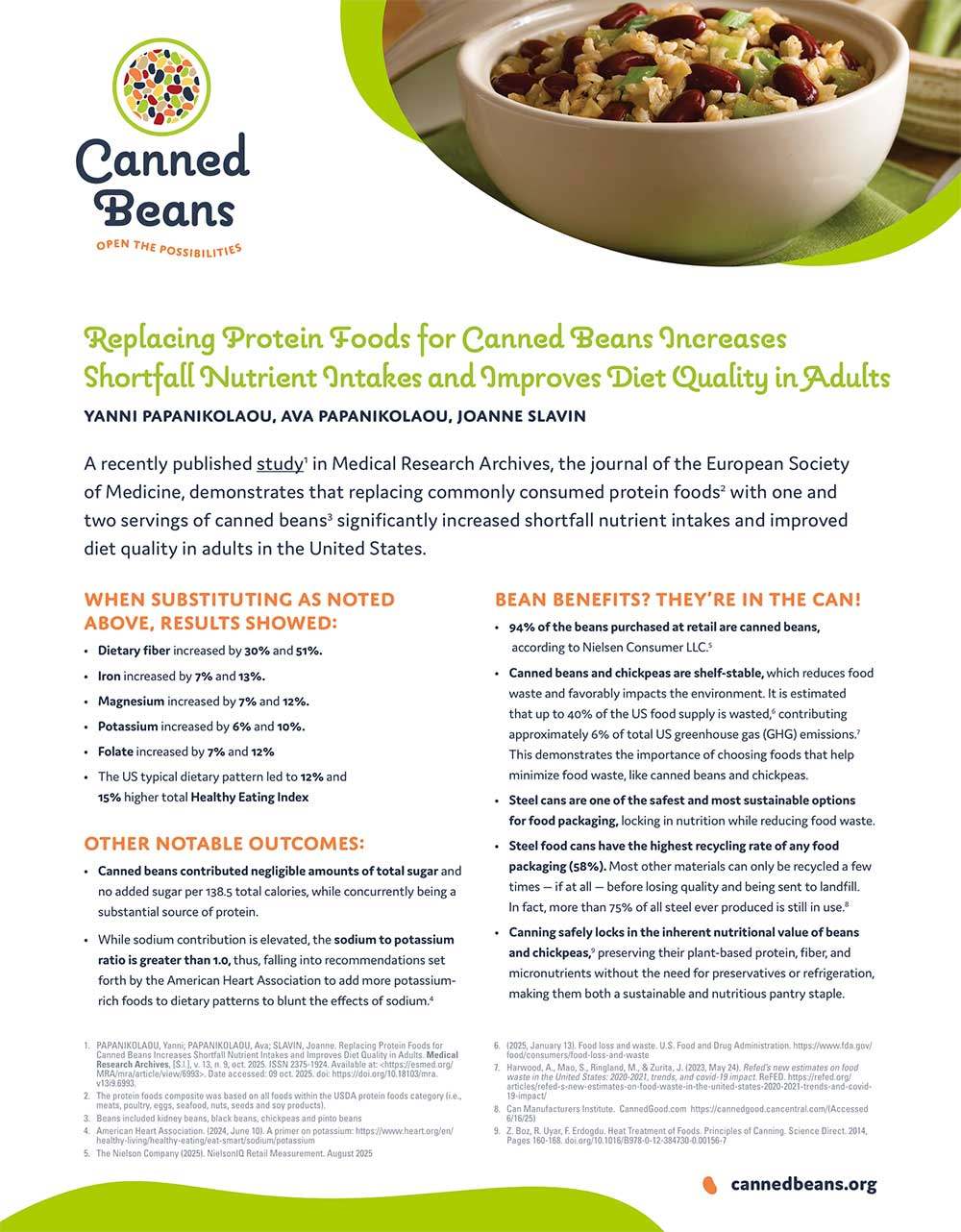
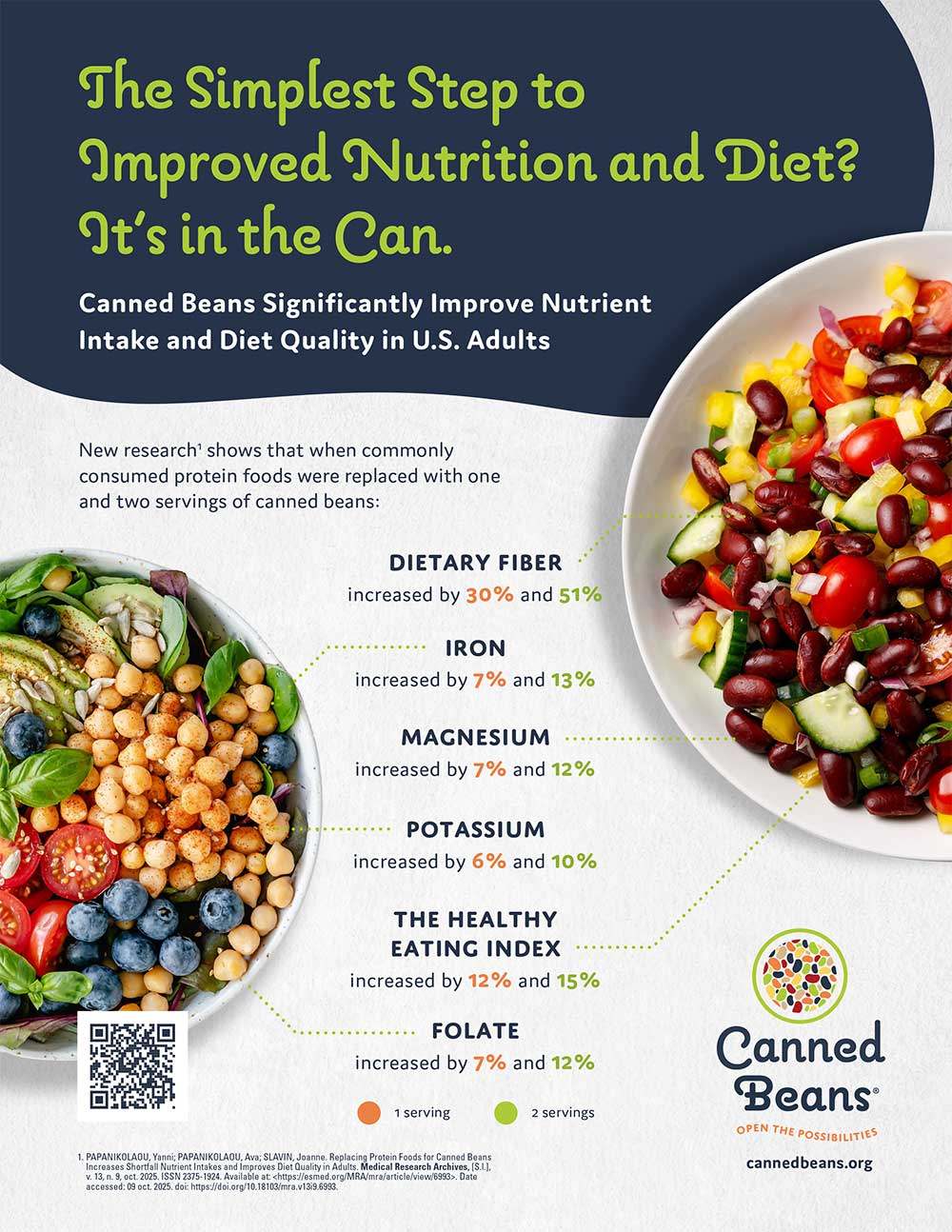
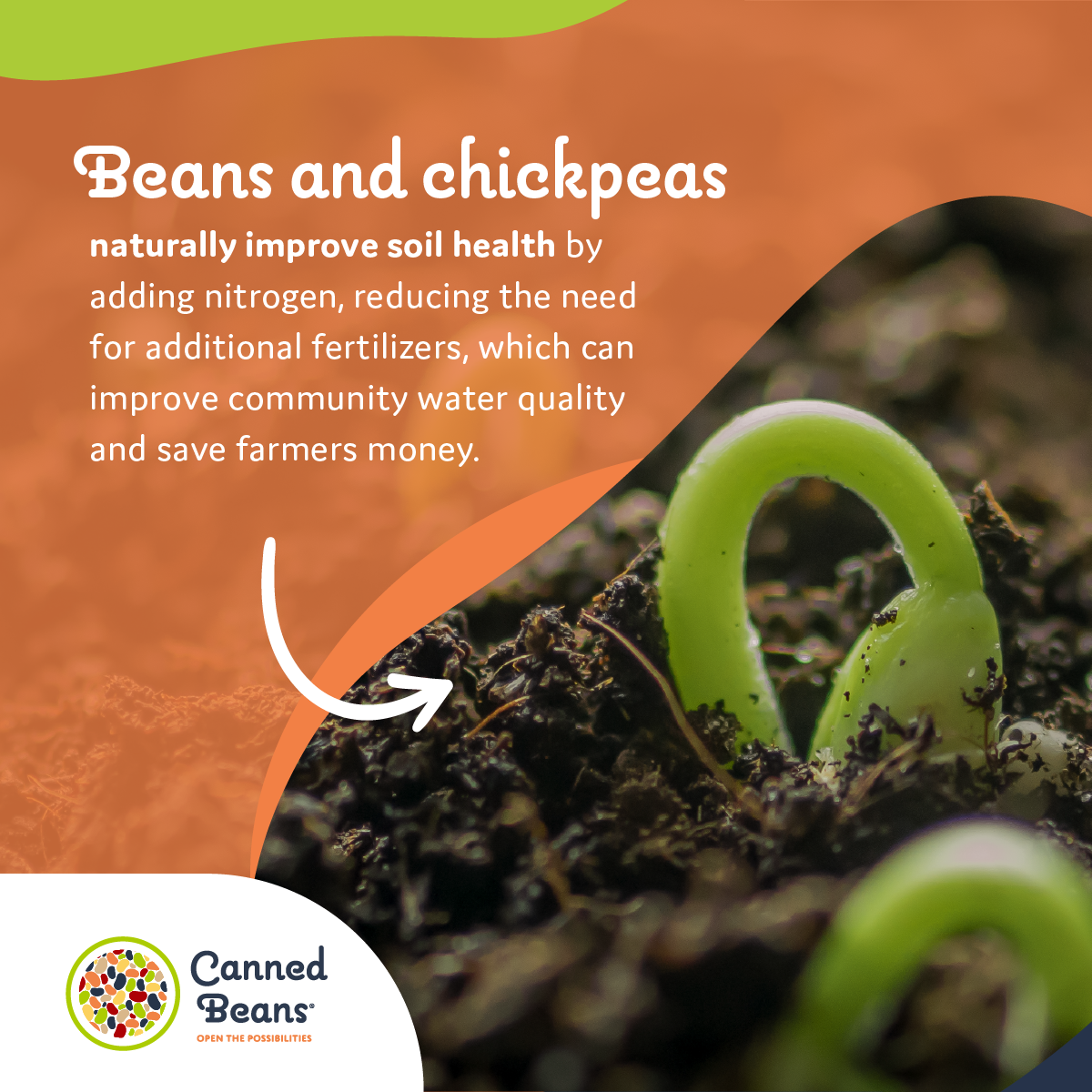
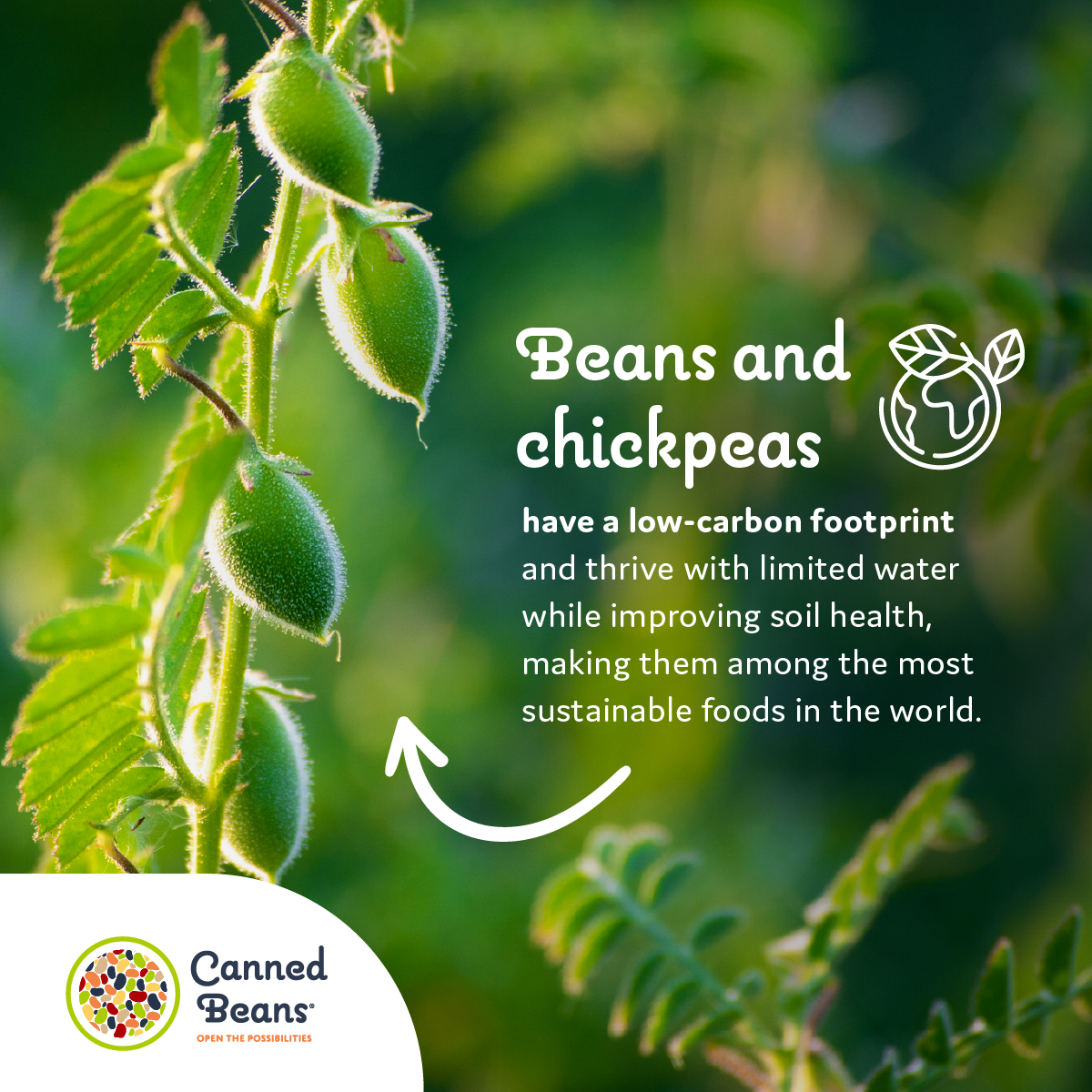
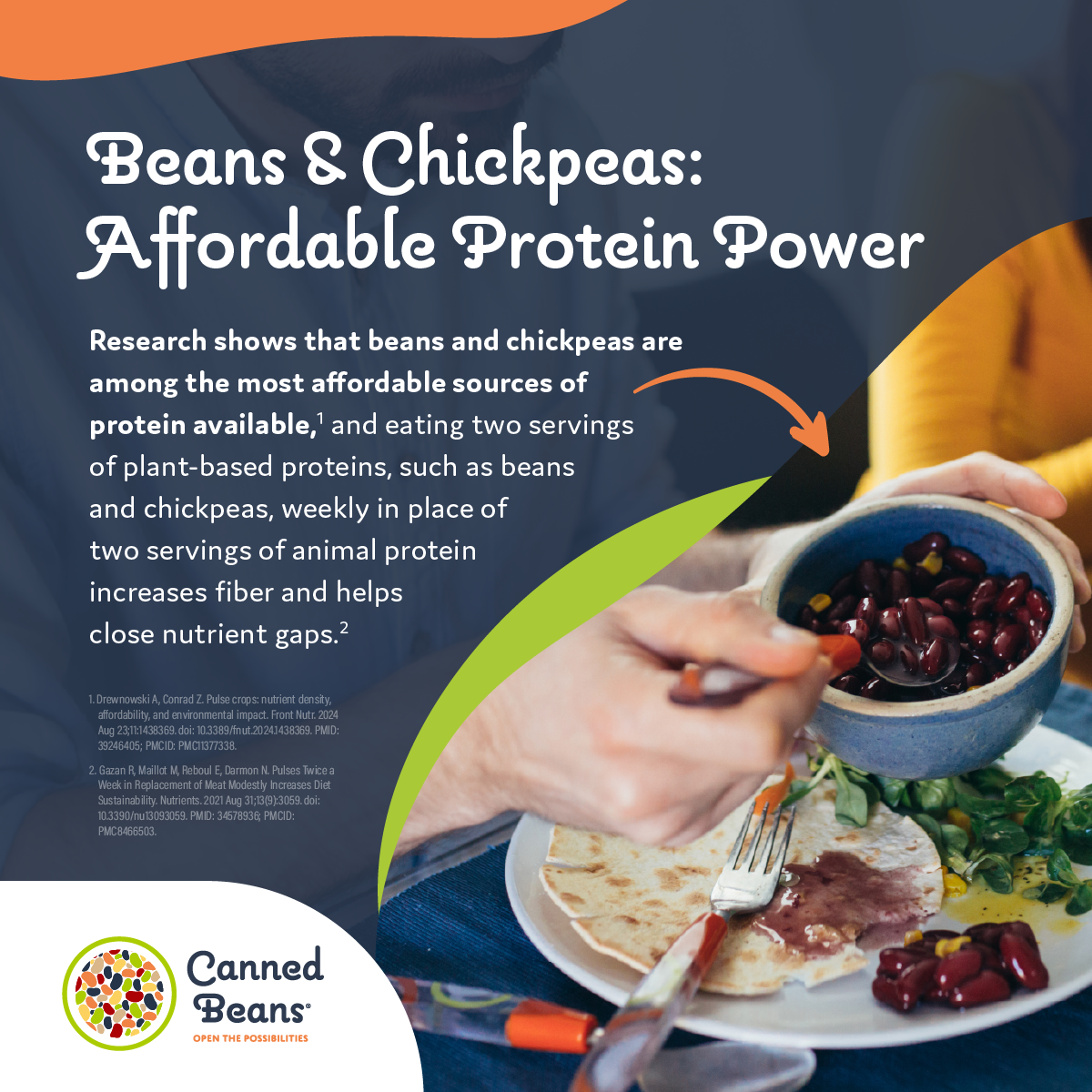
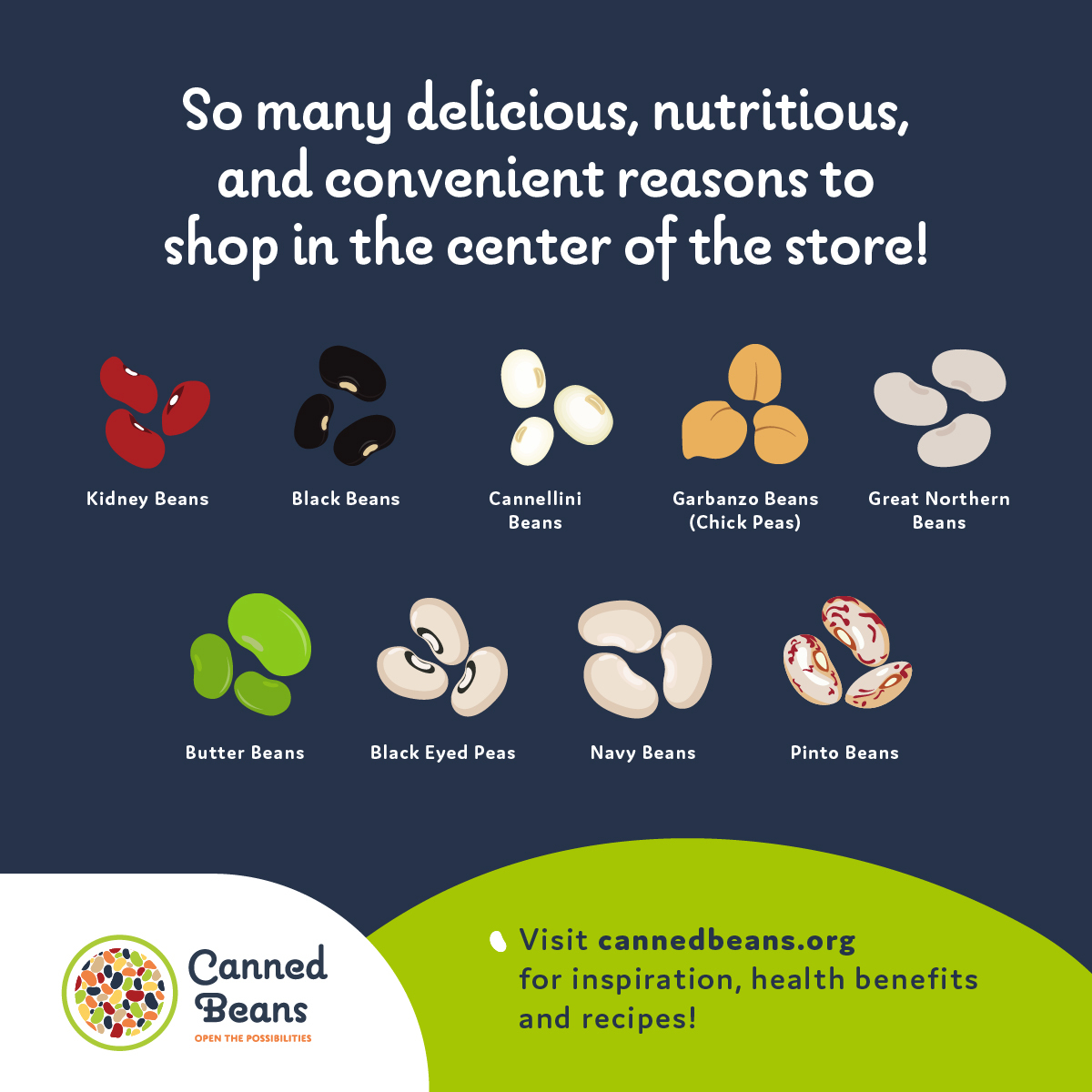
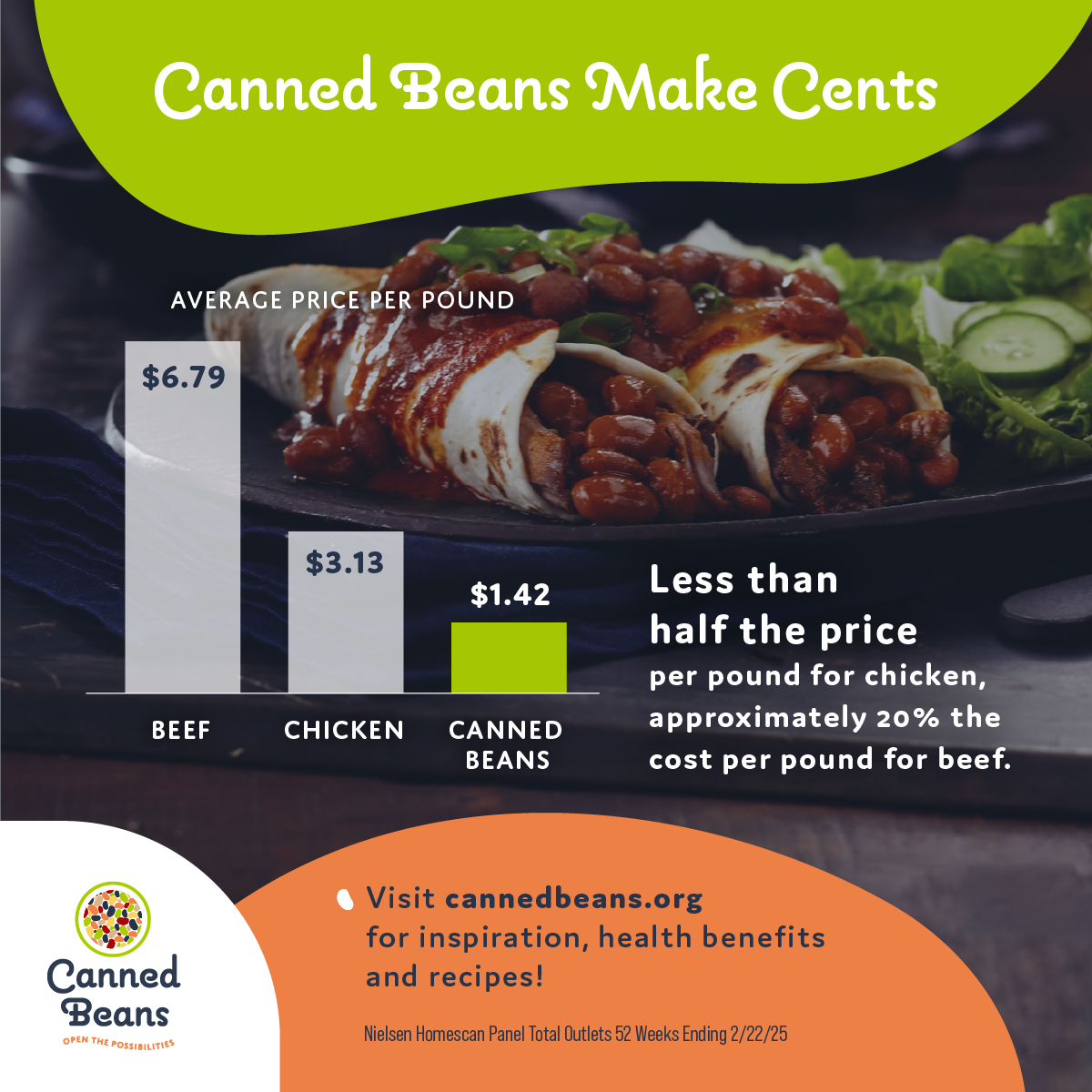
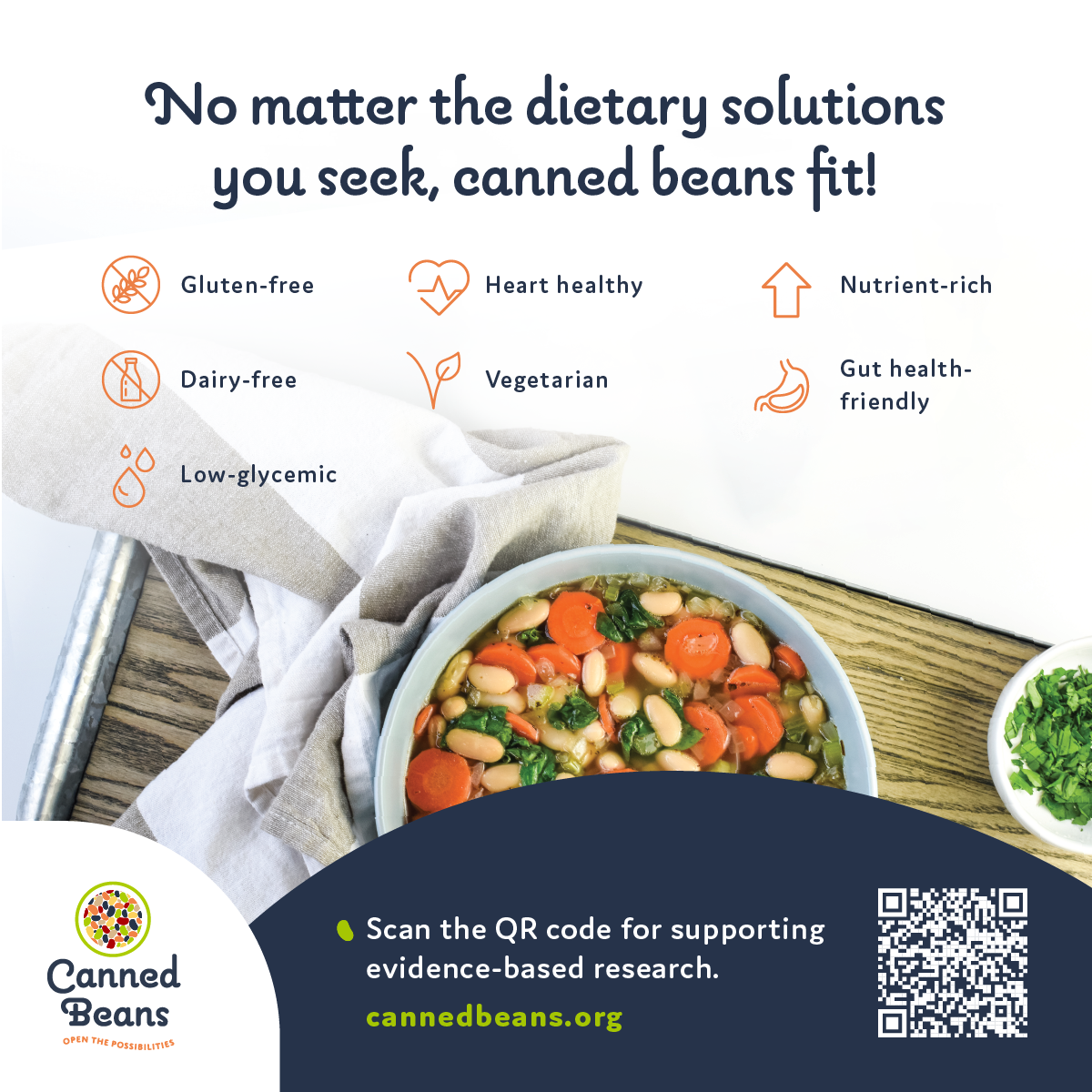
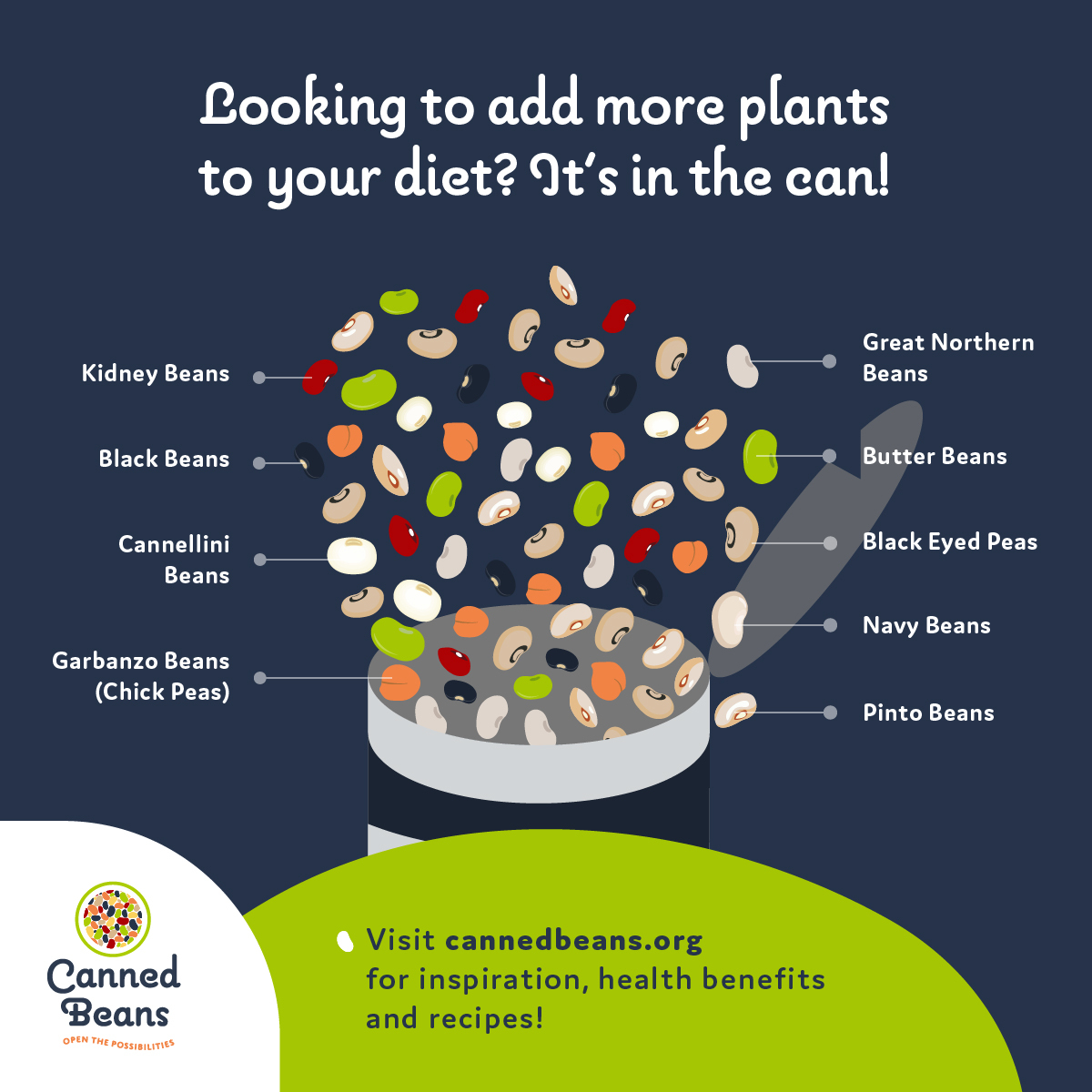
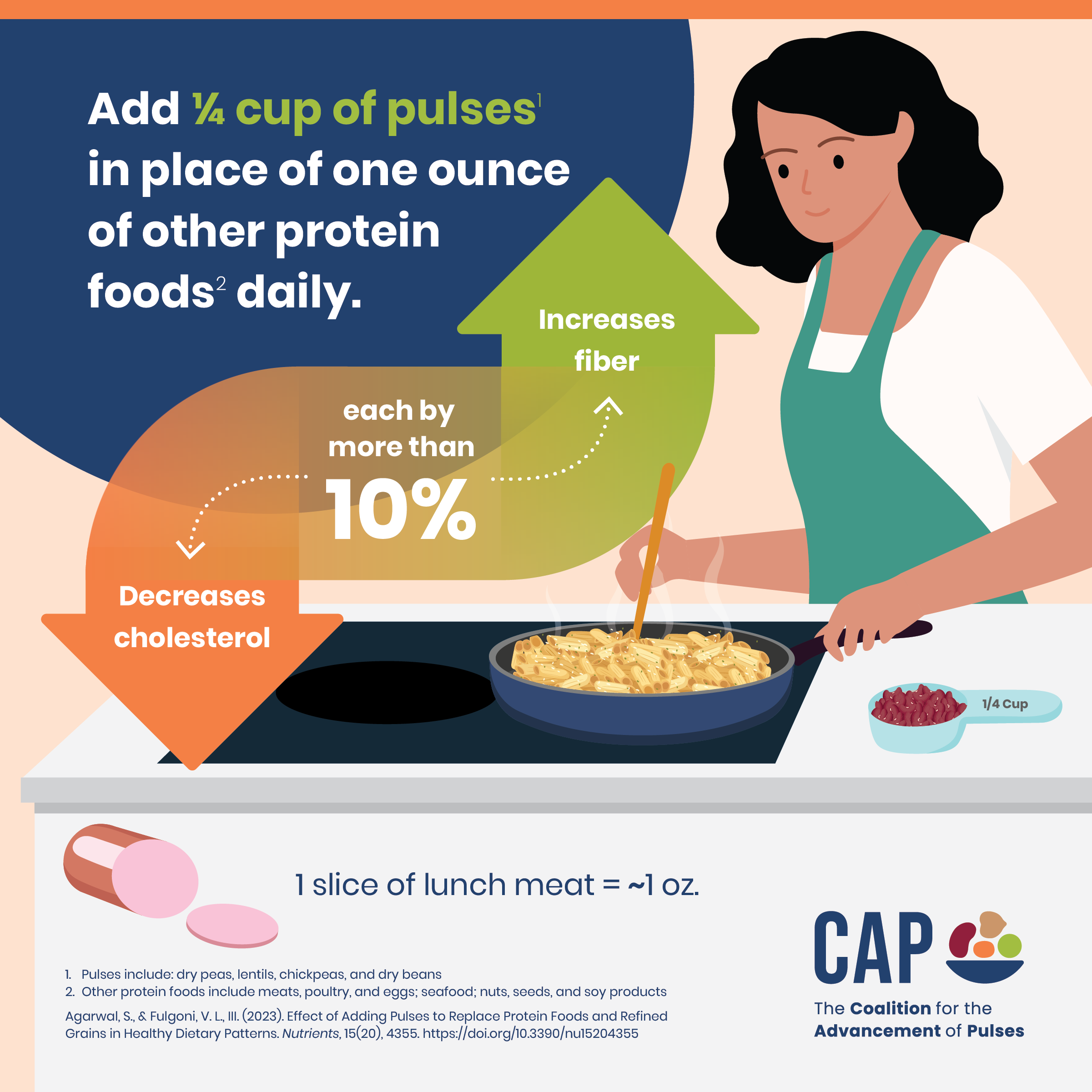
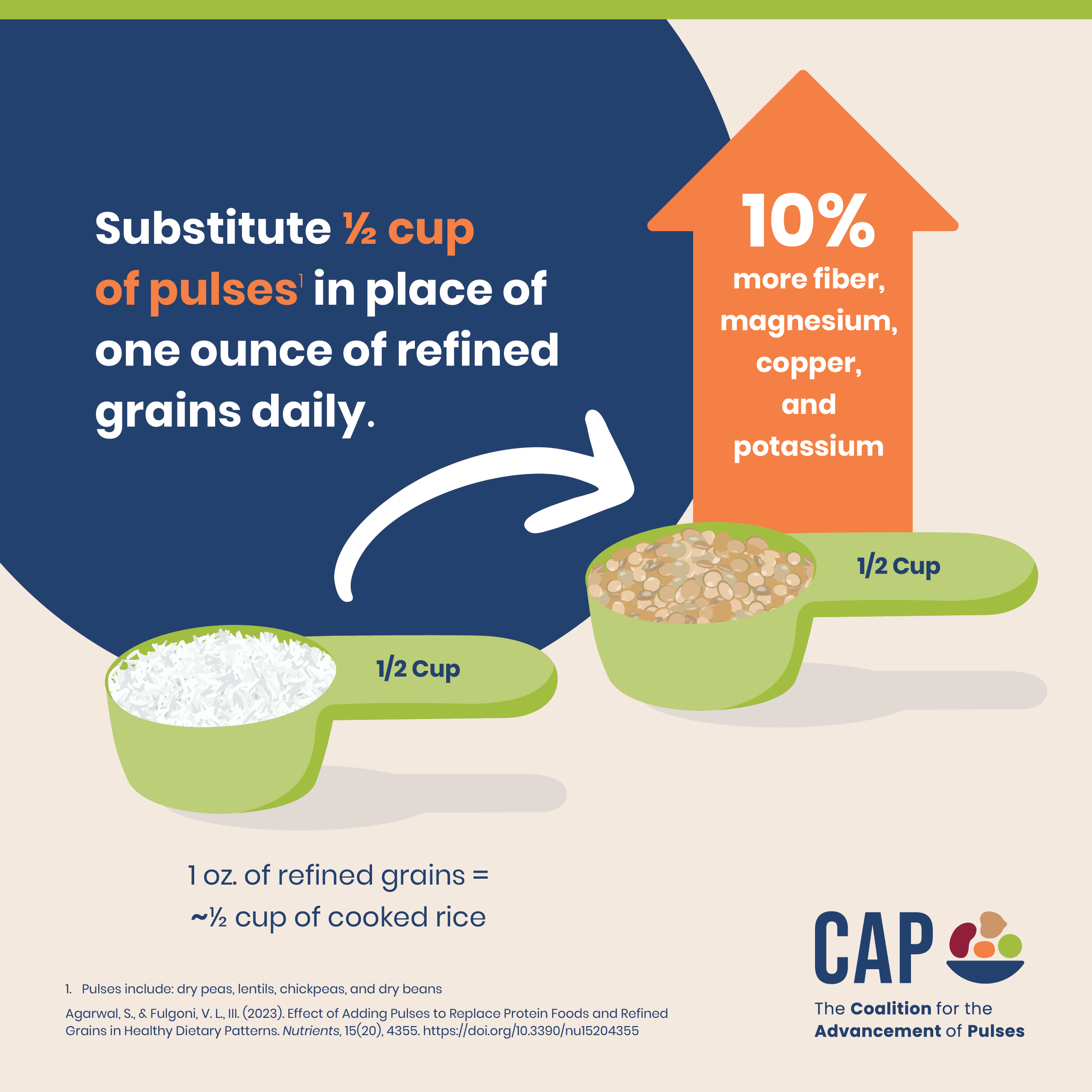
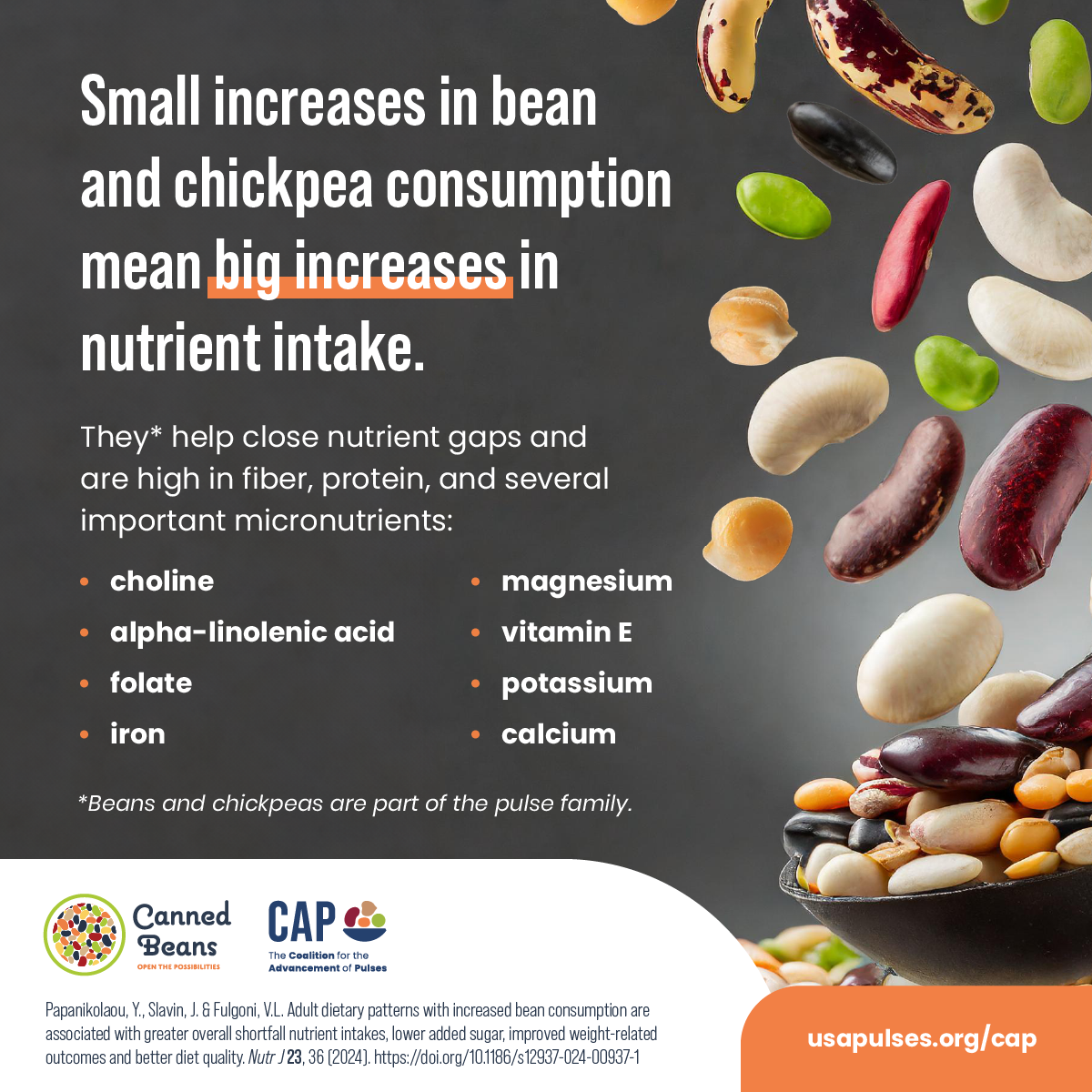
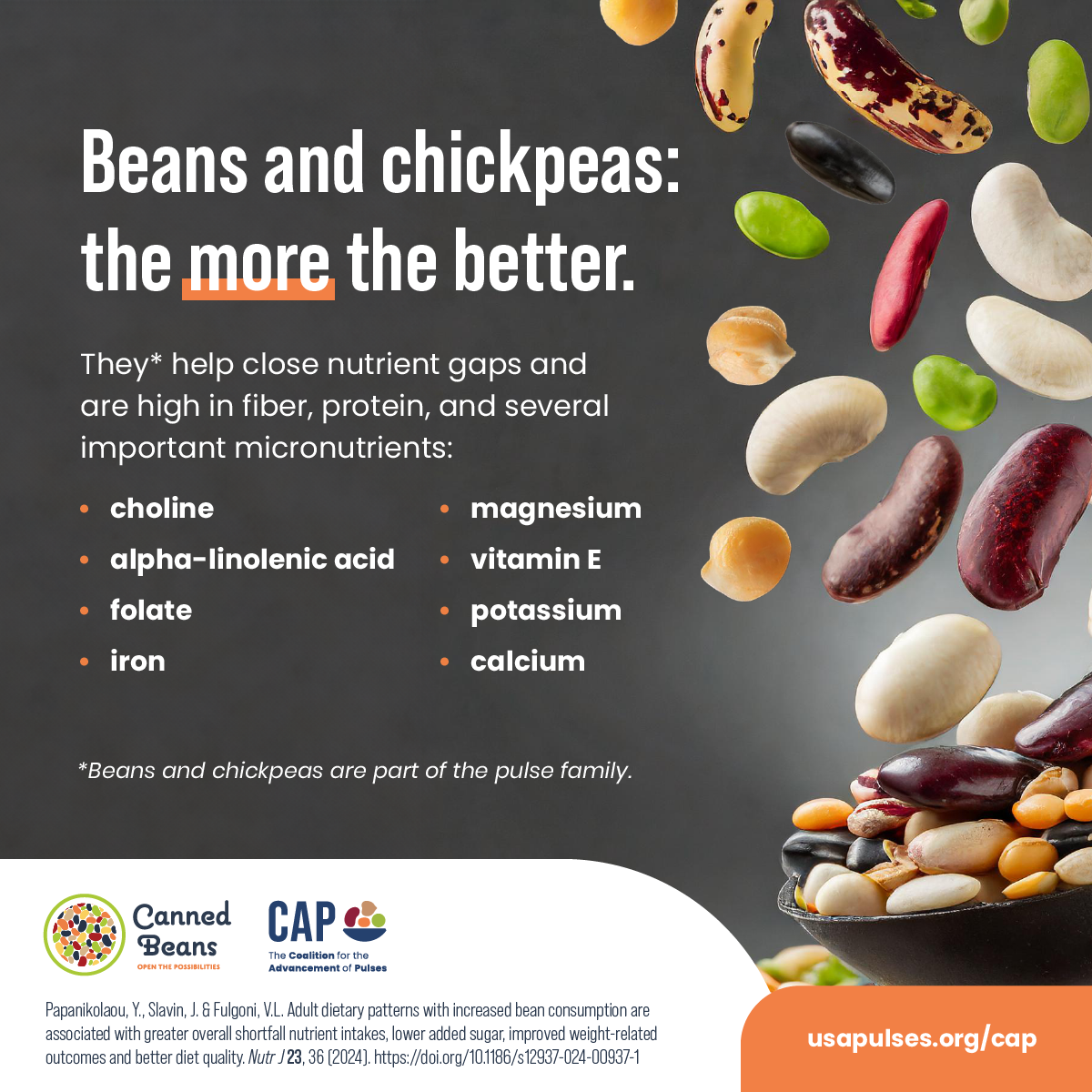
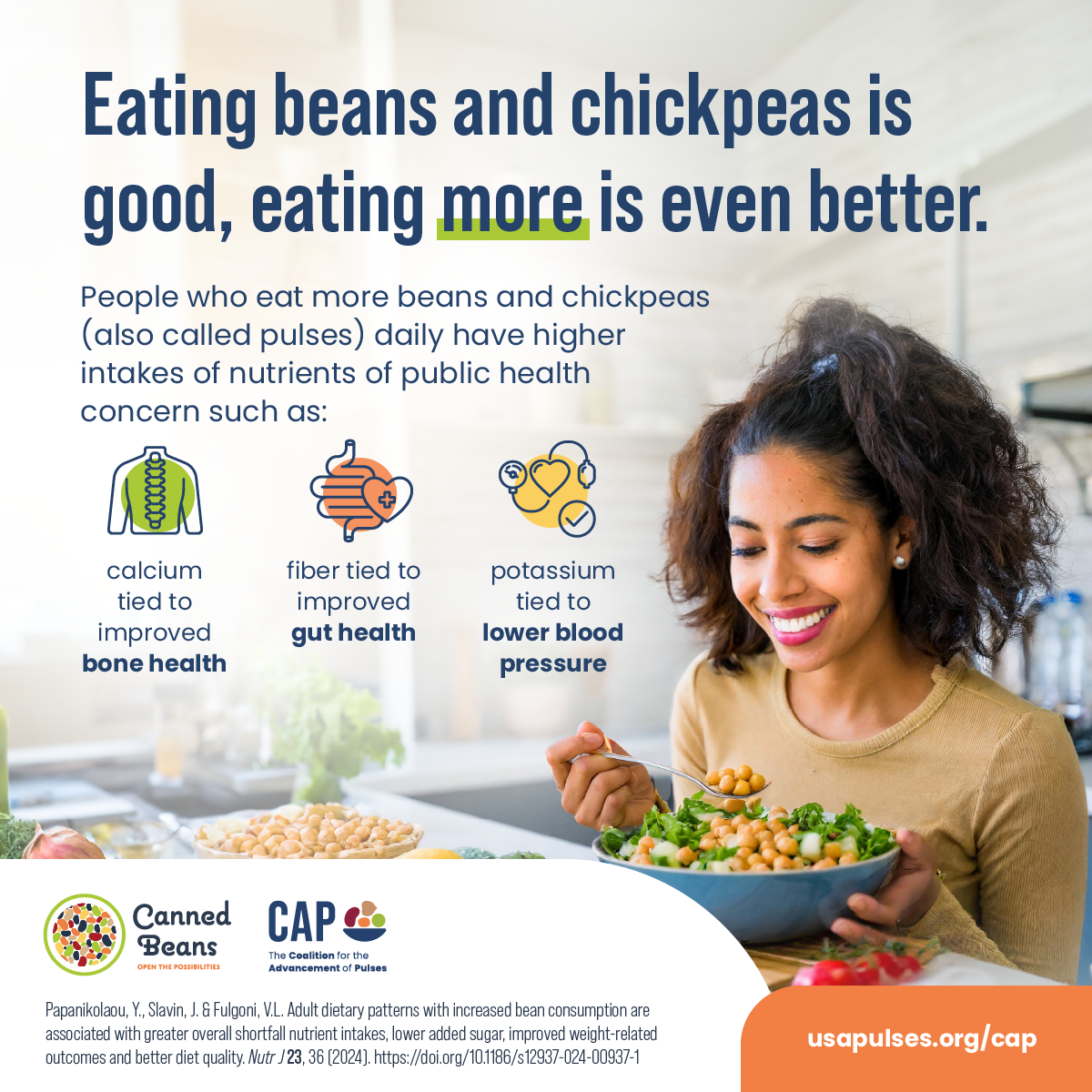
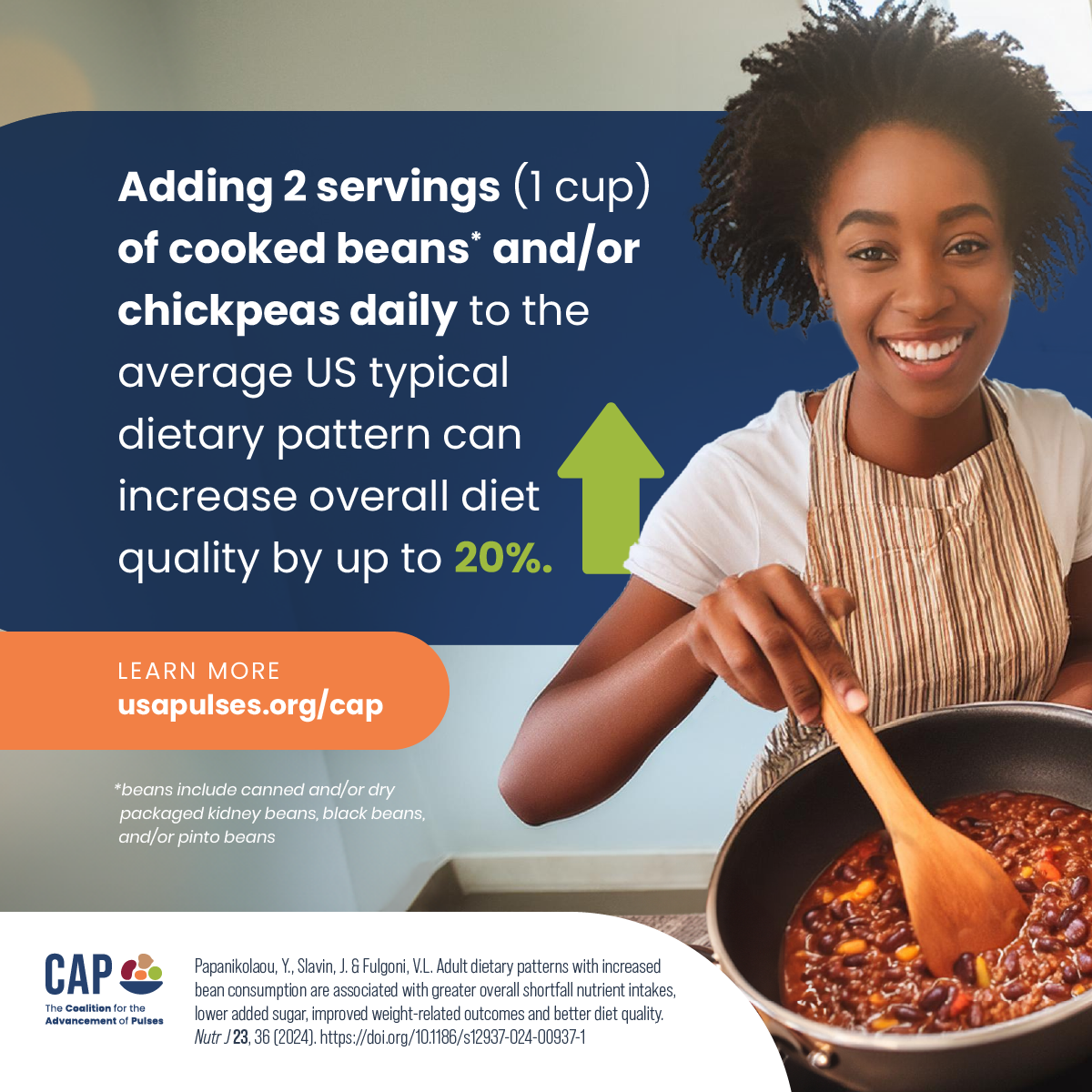
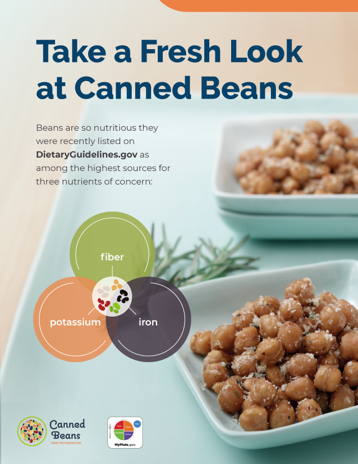
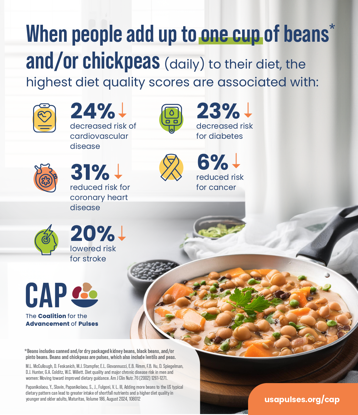
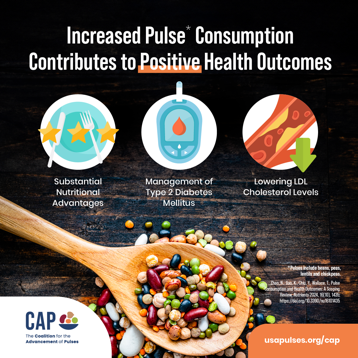
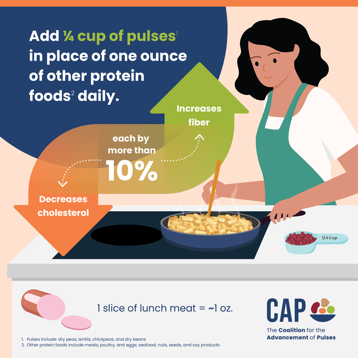
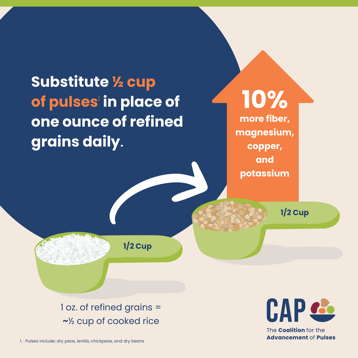
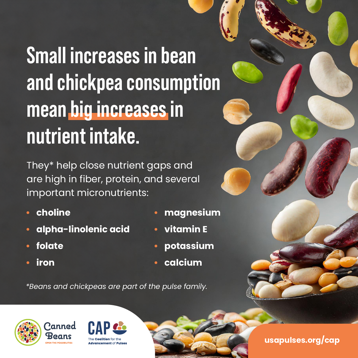

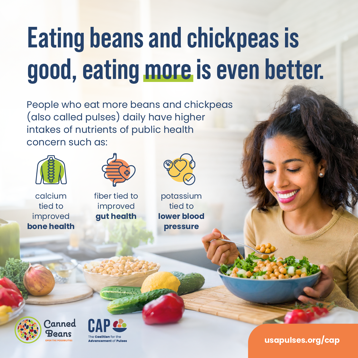
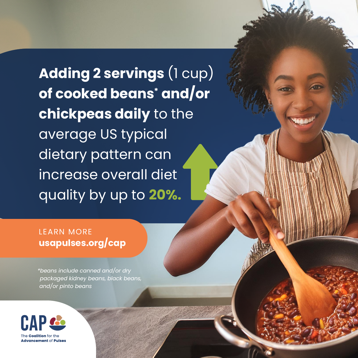
Social Posts
Beans are so nutritiously delicious and versatile, that they make for excellent social media posts throughout the year. Below are social media posts to provide your readers, fans, and followers inspiration to incorporate more beans into their daily diets more often.
January
February
March
April